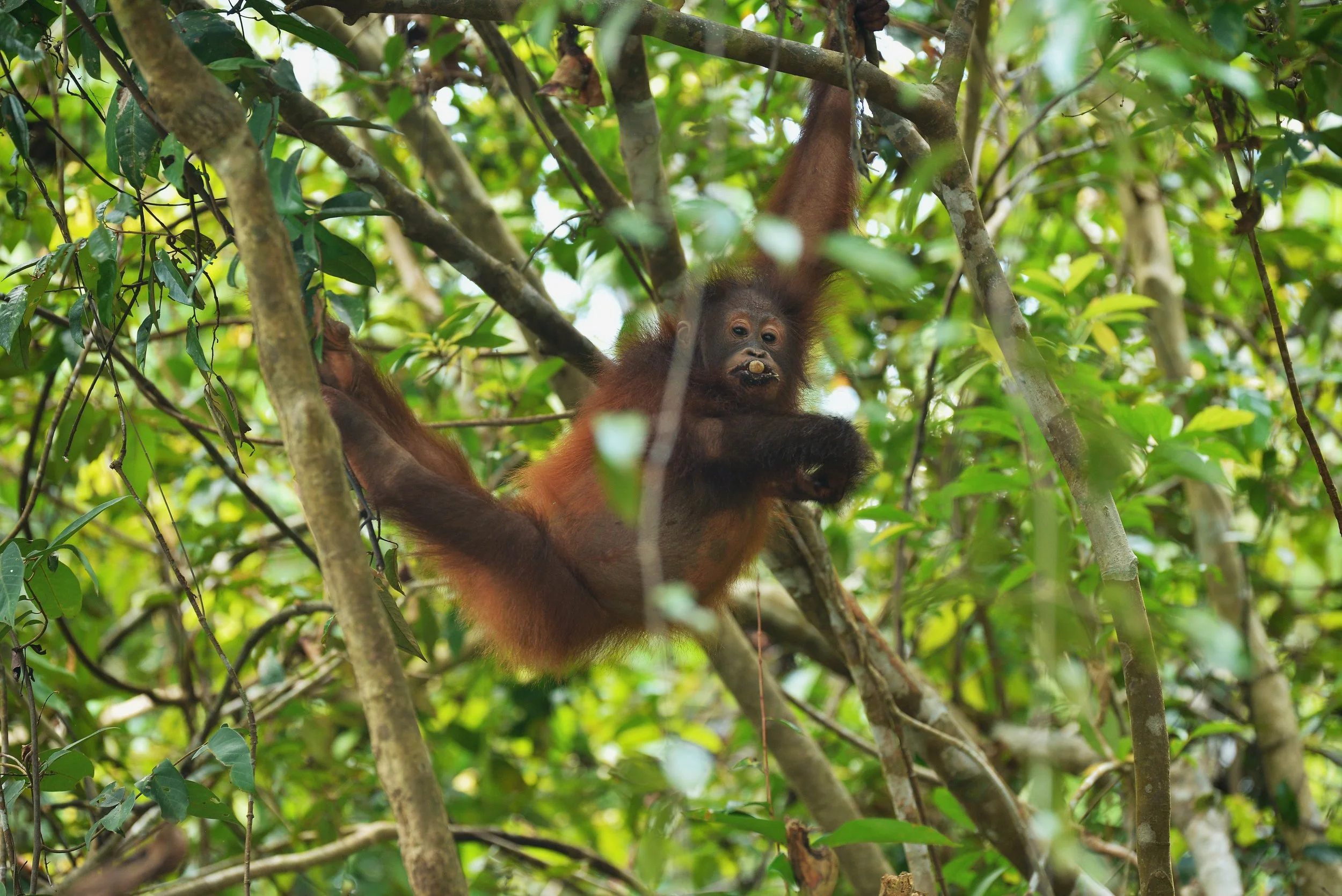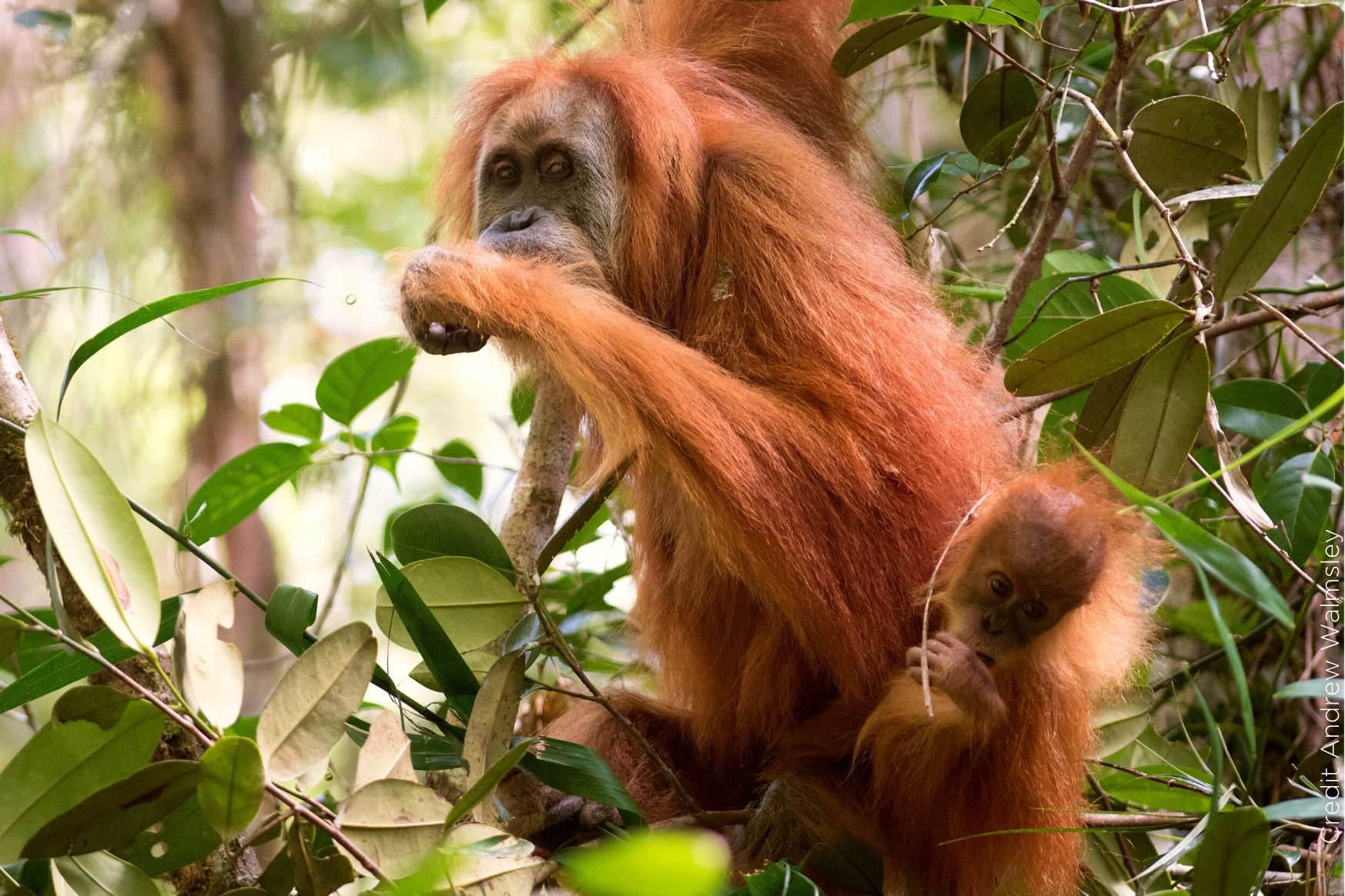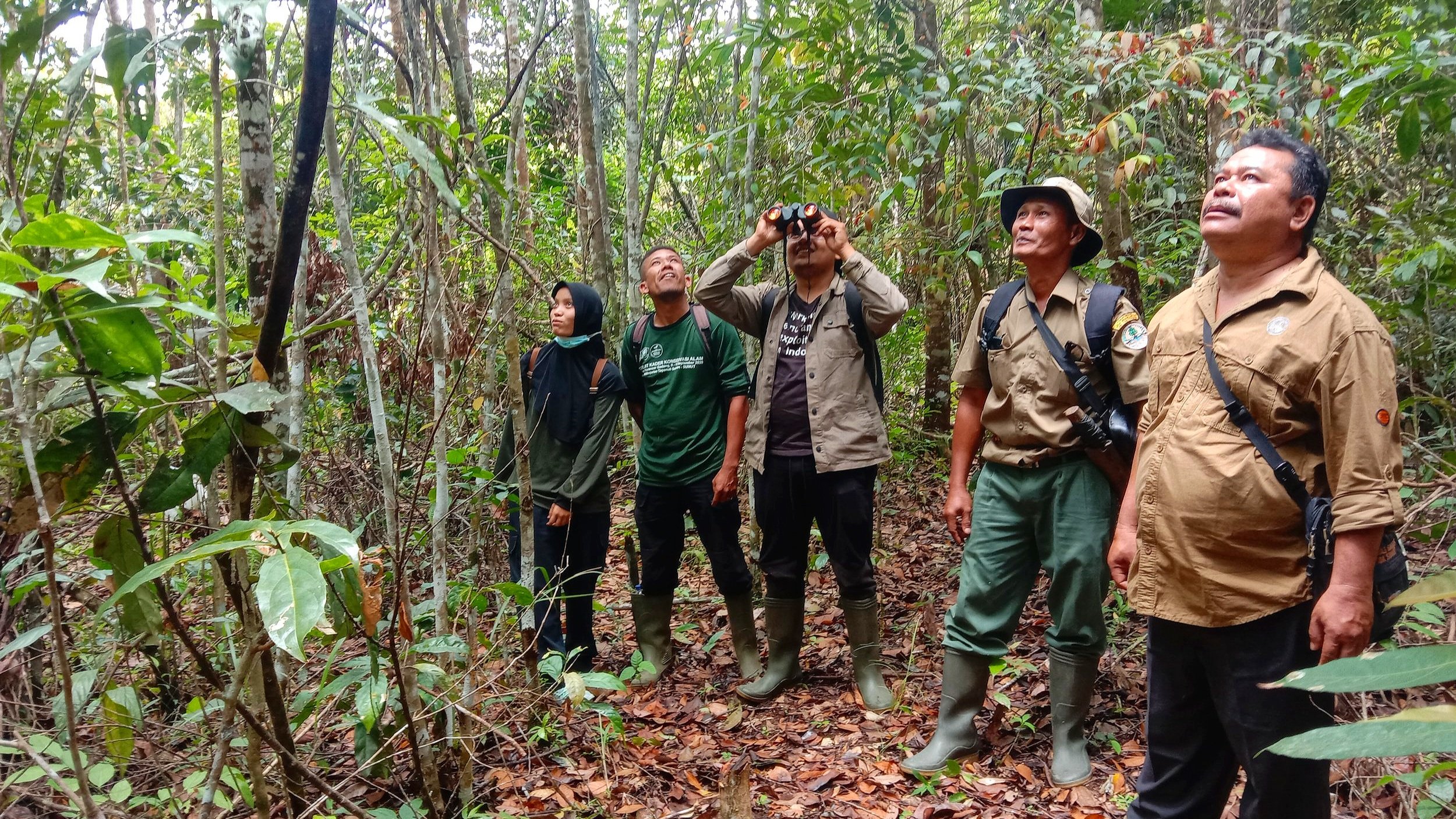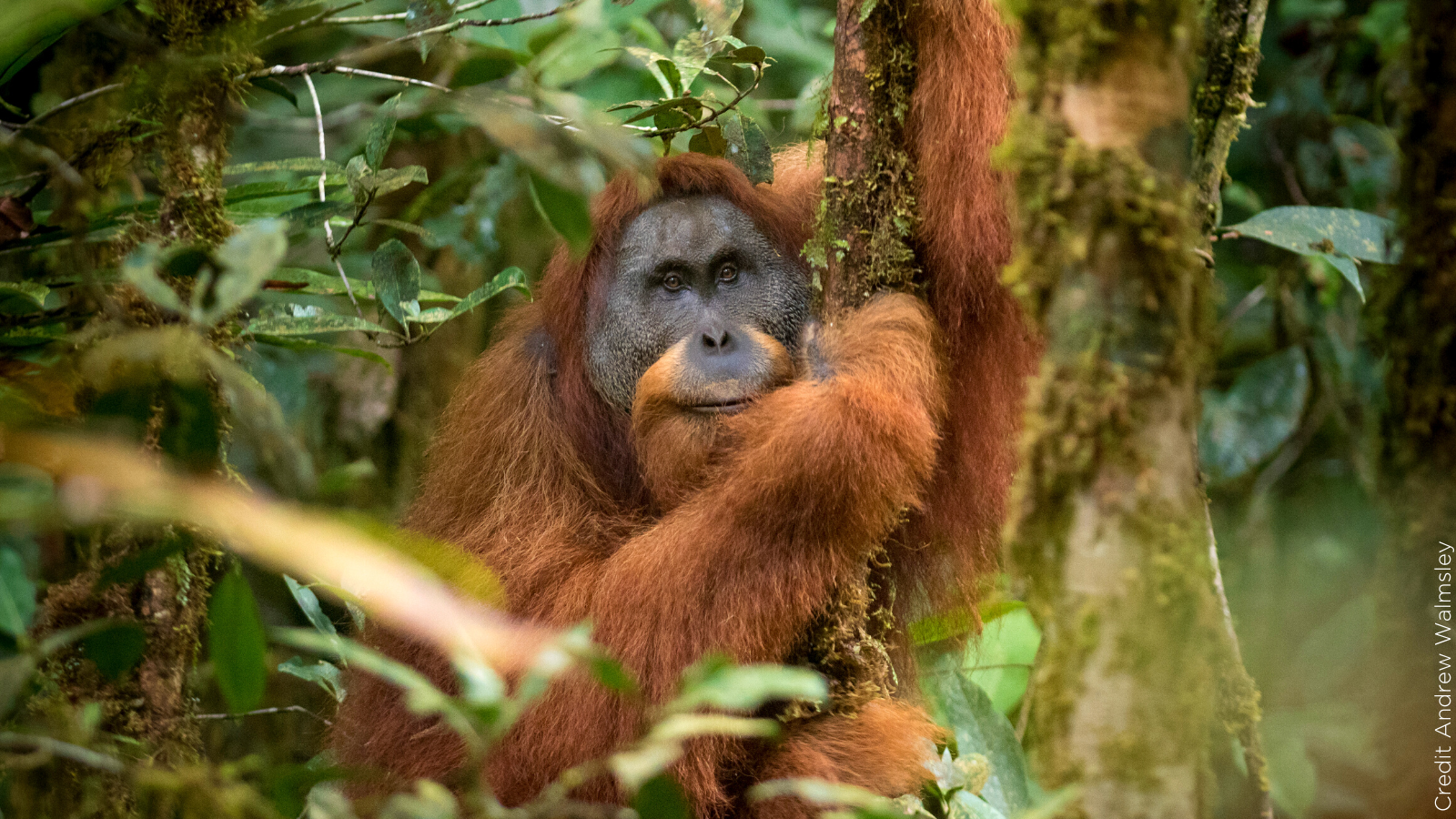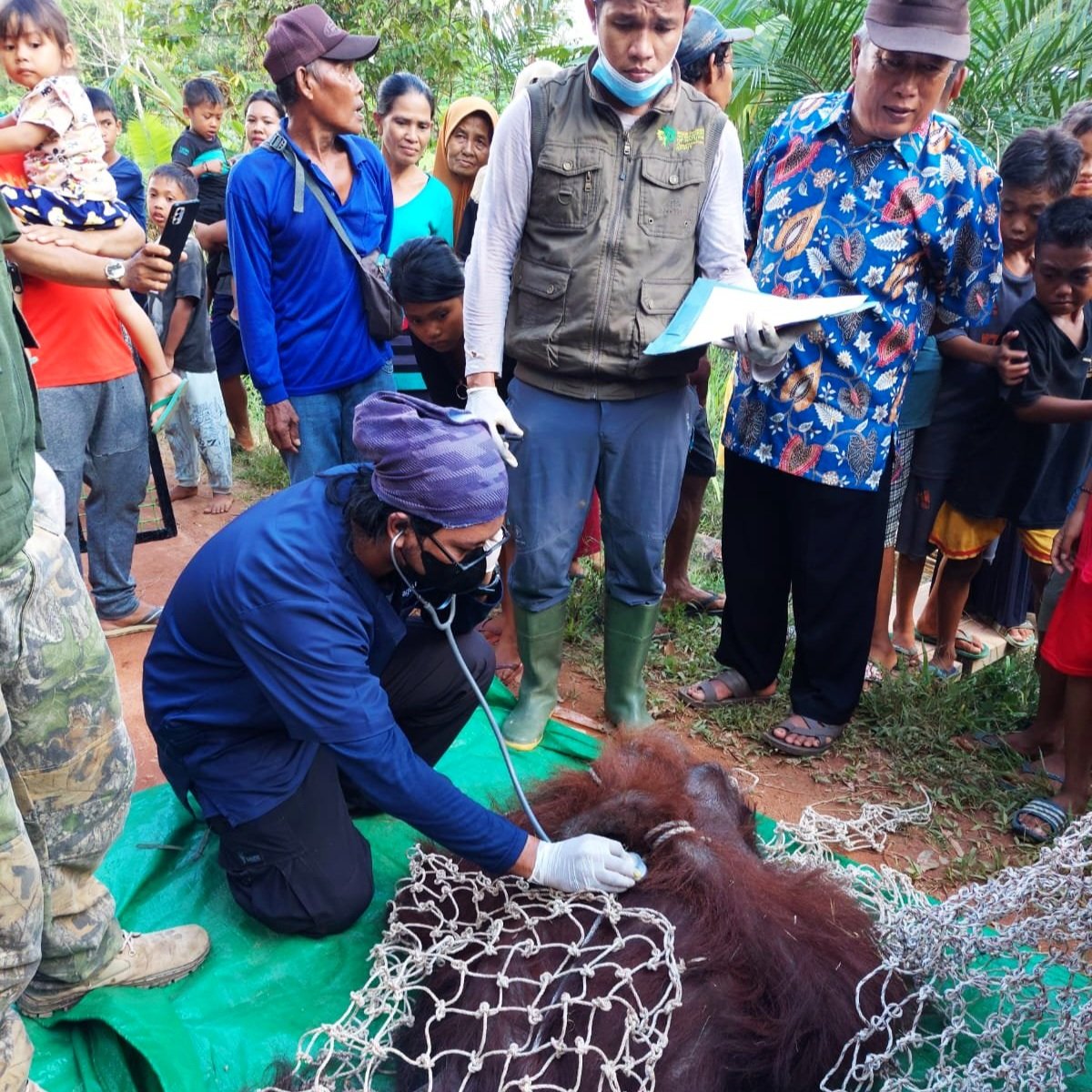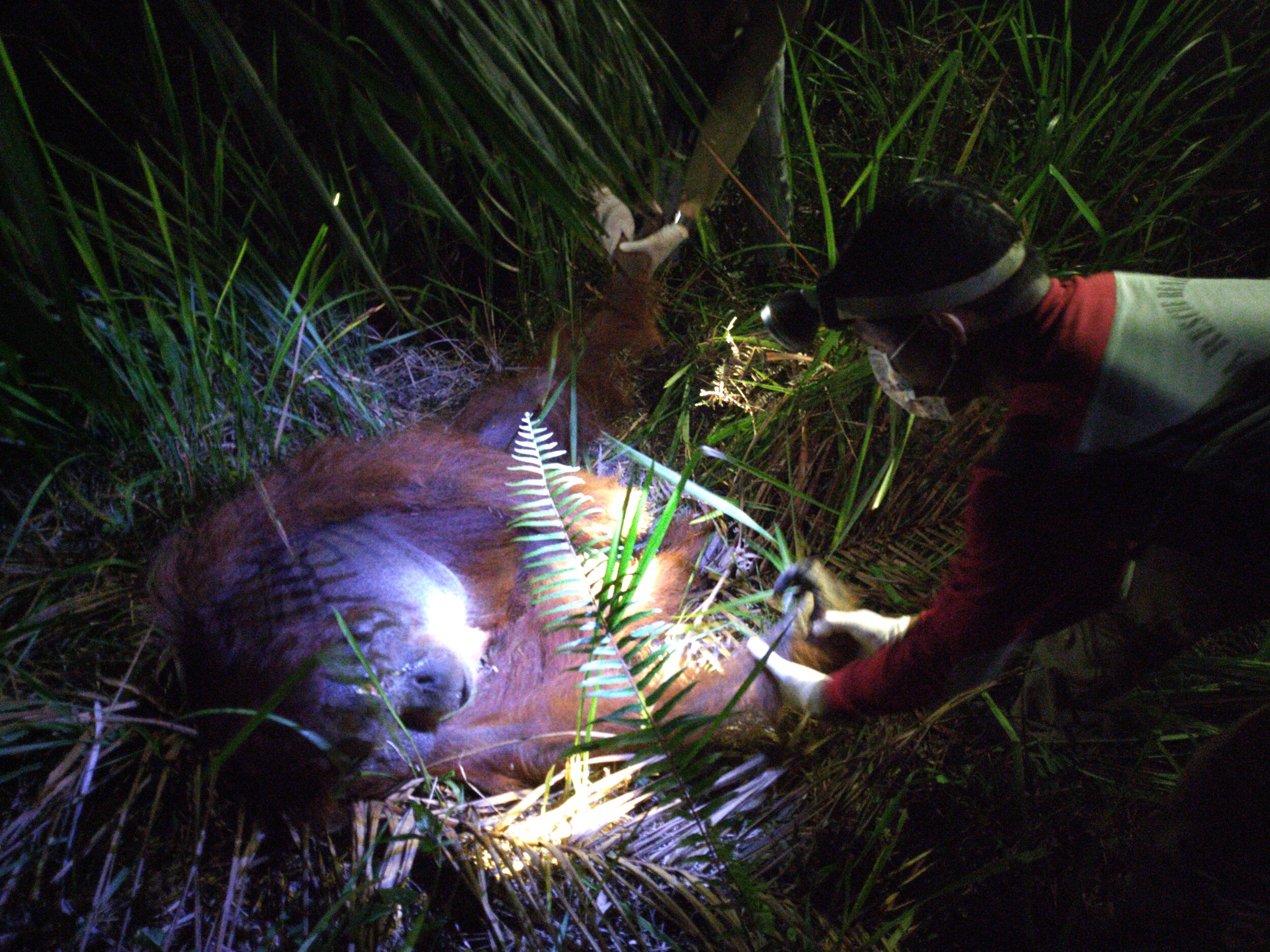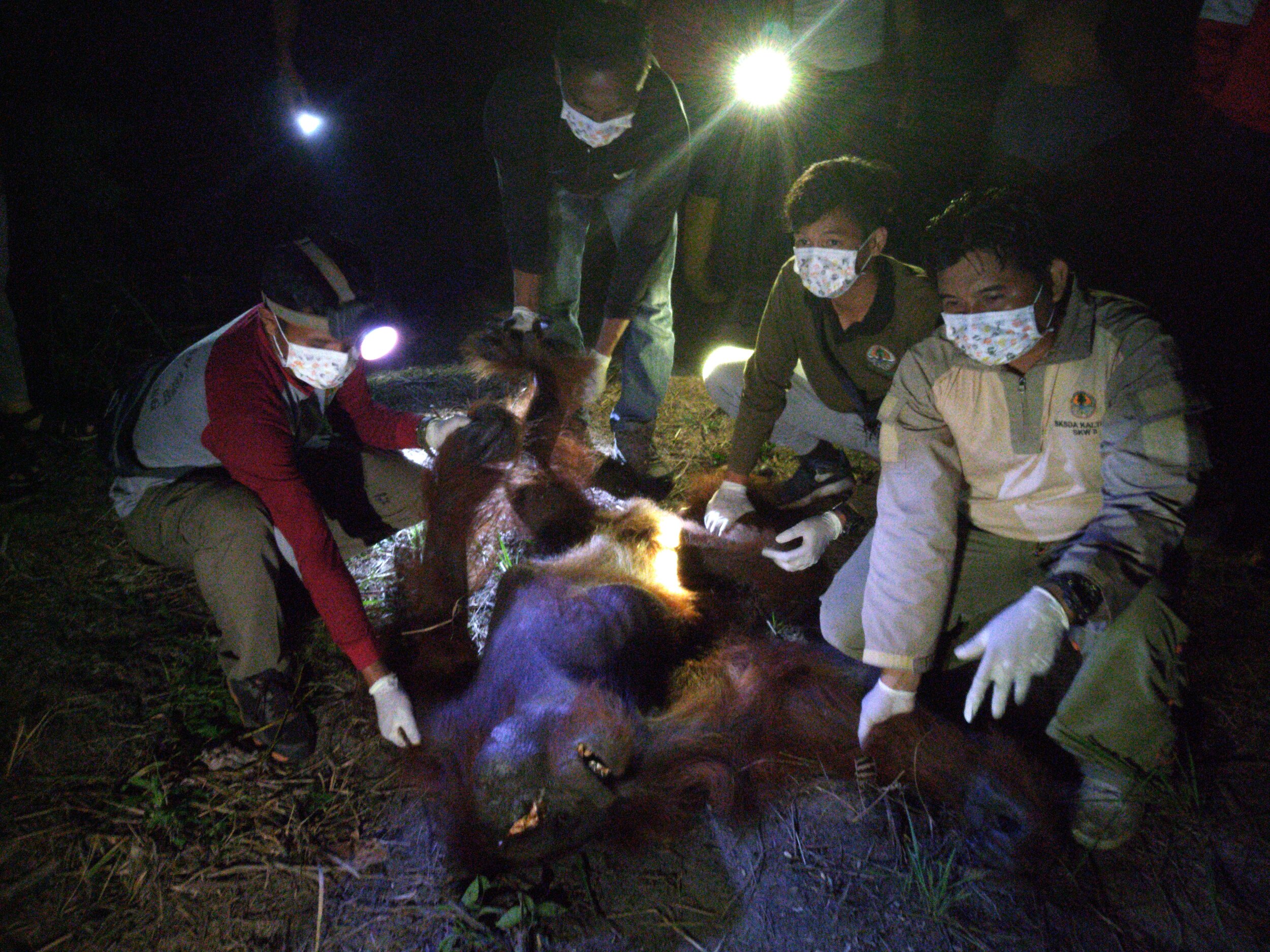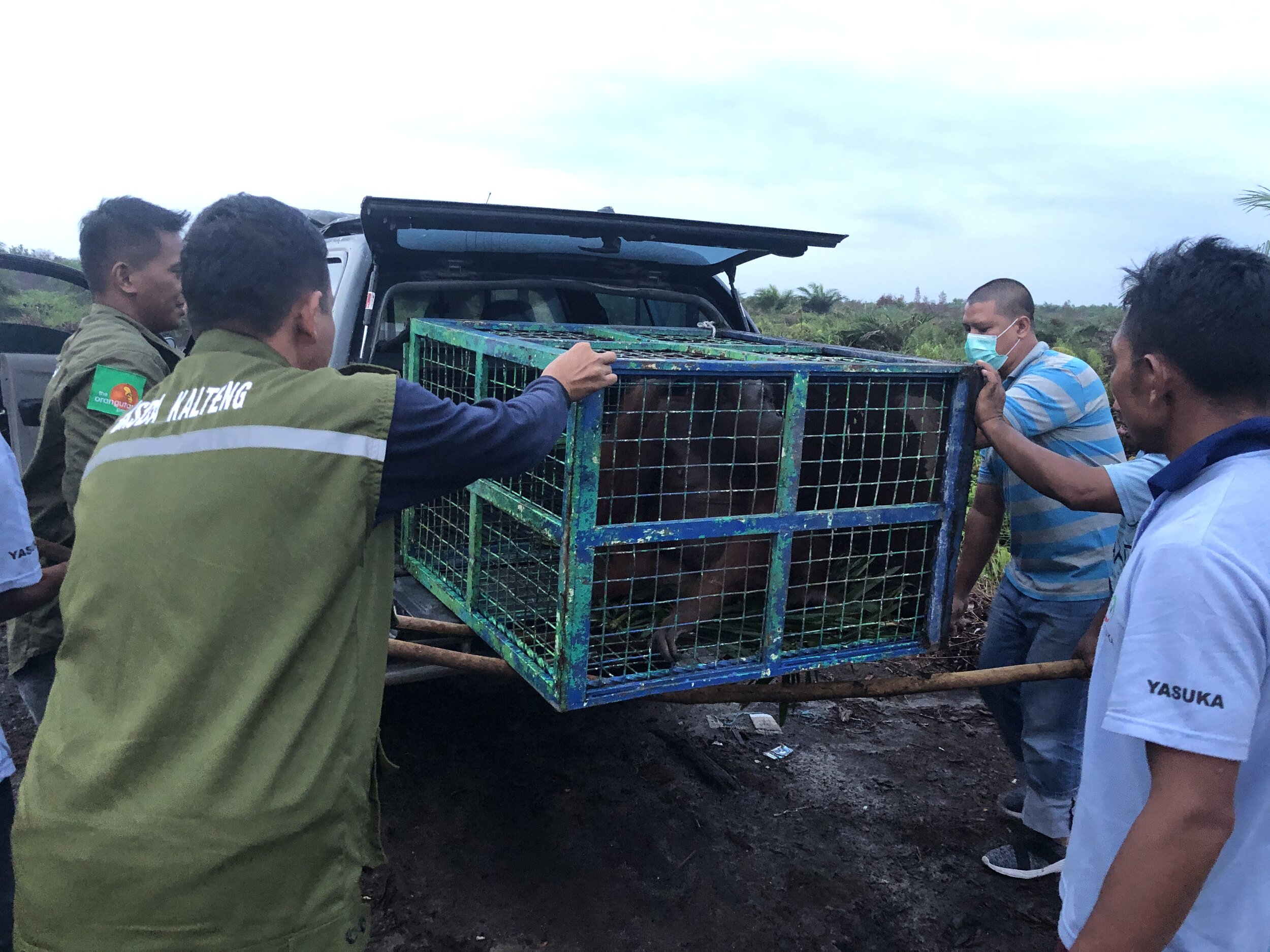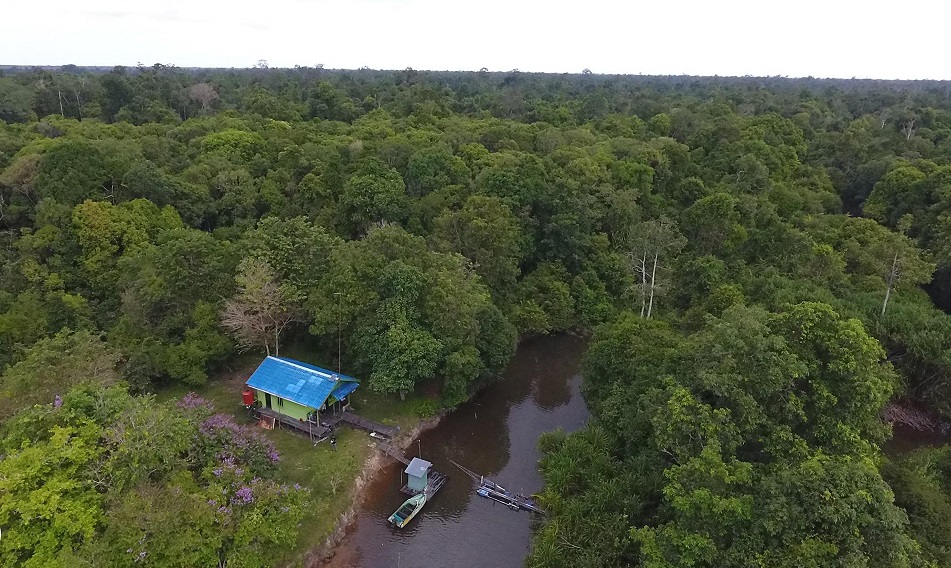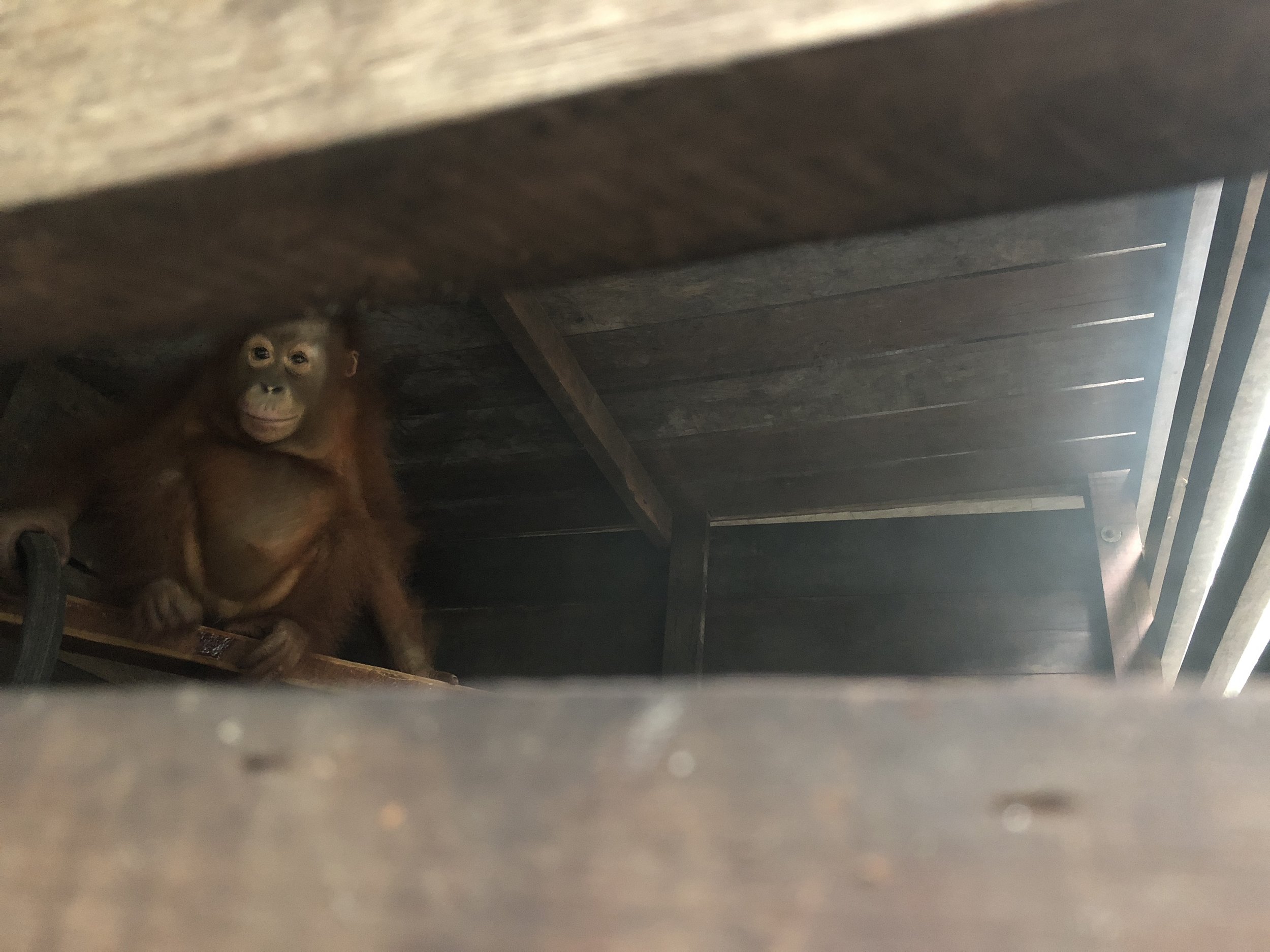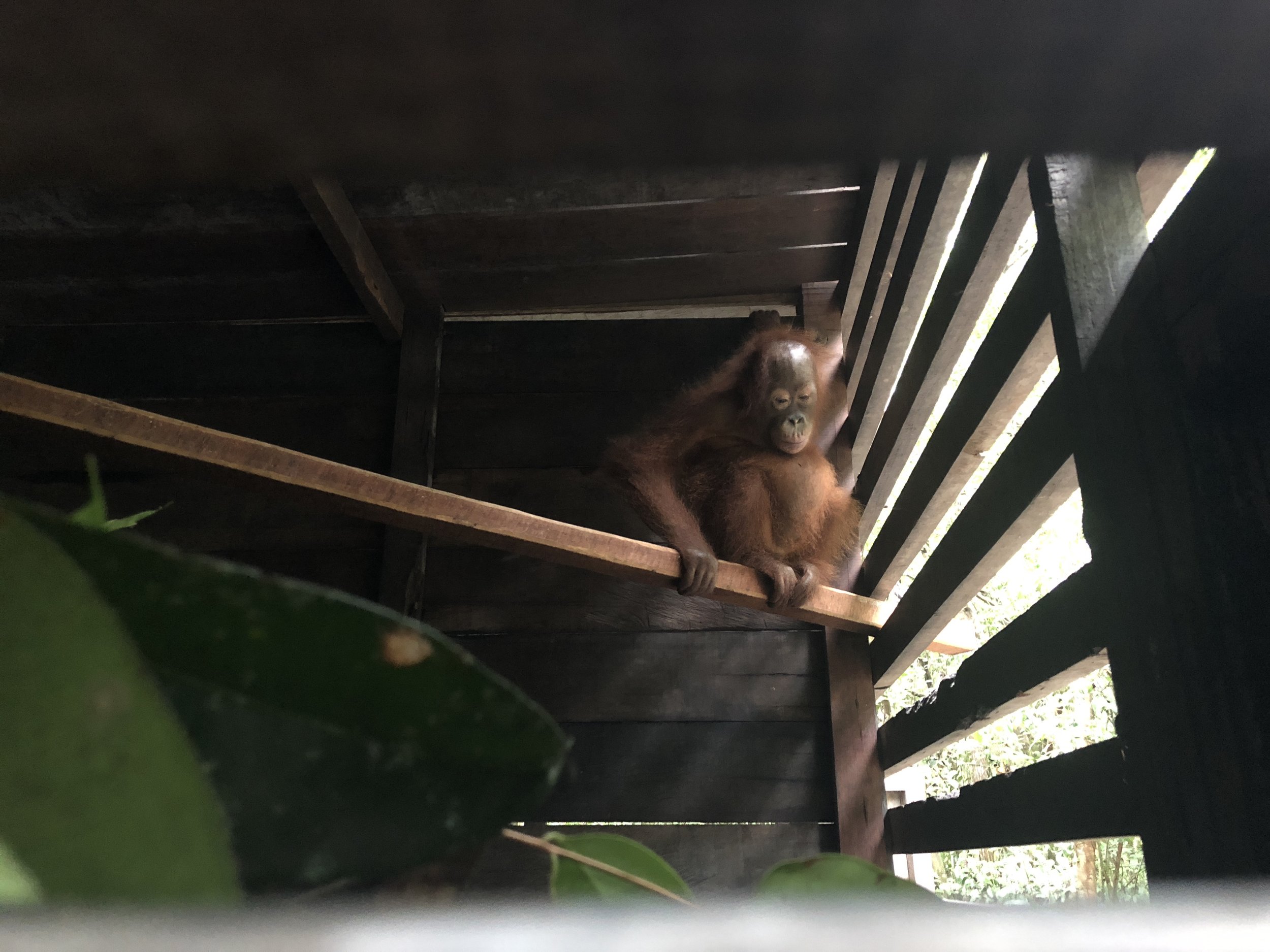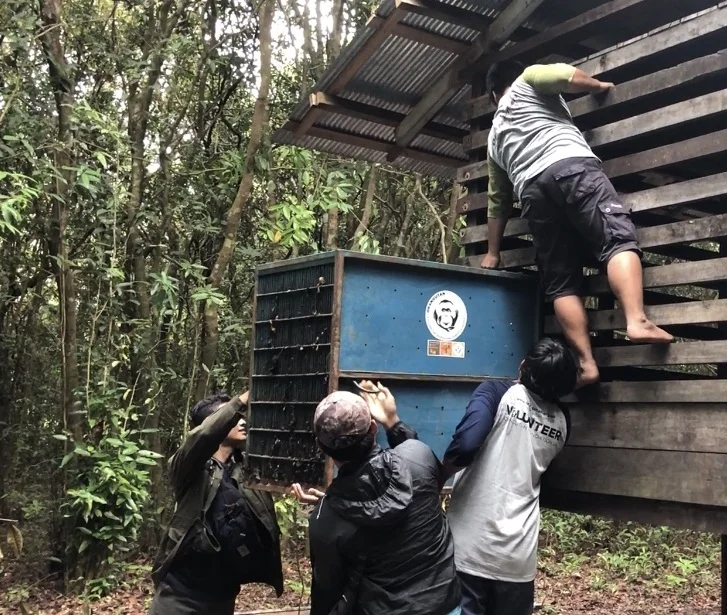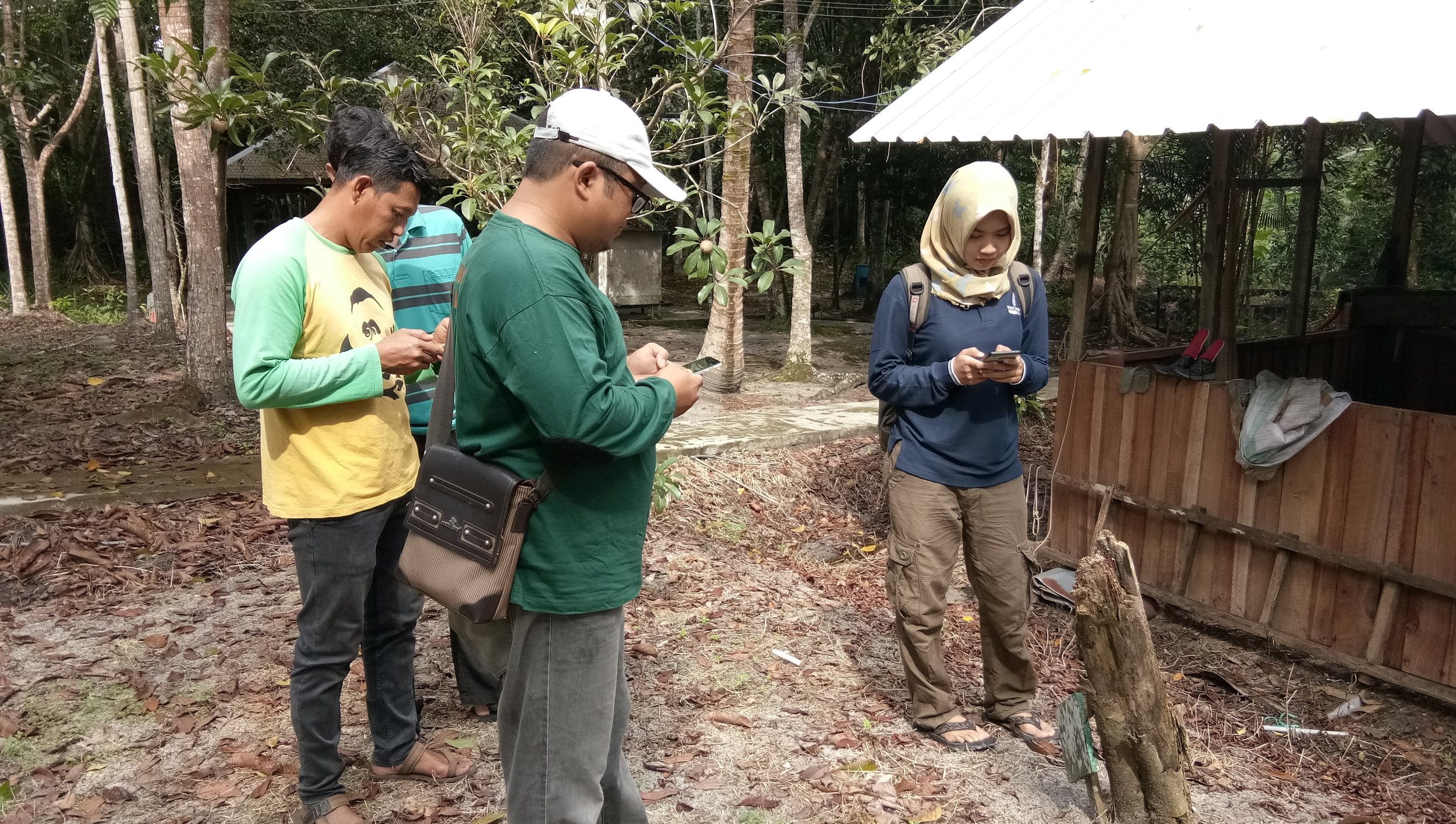Four infants were recently handed over to our care to join the soft-release programme for orphaned orangutans. But one orangutan, Kiki, is very particular about who is friends with! Orangutans have personalities from a very young age - and can are very entertaining as they grow into themselves more and more.
Orangutan Stories: Epeng - new home, new hope
Orangutan Stories: welcome to Amel – but what happens to the mothers of orphaned orangutans?
2024 highlights: A look back on our conservation achievements together for orangutans, forests, and people
Orangutan Stories: Exploring Food in the Forest
Saving the most endangered great ape - the Tapanuli orangutan
With only 800 individuals remaining in the wild, the Tapanuli orangutan is the rarest species of great ape. Their home in the mountainous forest of Batang Toru, Northern Sumatra, spans around 250,000 acres but is heavily fragmented due to habitat loss. Consequently, this means that the Tapanuli orangutan is also the most vulnerable of the great apes to become extinct.
We’re determined to provide a future for all orangutans, but as the Tapanuli’s forest is located far from our local programmes in Central Kalimantan, Indonesian Borneo, we’ve called upon a dedicated team who can help us.
Scorpion - The Wildlife Trade Monitoring Group, are a local NGO in Sumatra whose primary focus is to tackle animal exploitation by working with government and nearby communities. As their main goals match those of Orangutan Foundation, we could think of no one better suited to help us ensure a safer future for the Tapanuli orangutan, and here are three successful approaches that they use to do this:
1) Patrols. With the help of local law enforcement, patrol teams regularly visit 11 sites in the Batang Toru region which are orangutan habitats or areas of suspected illegal activity. It can be daunting prospect to explore a remote patch of rainforest which may harbour illegal loggers, miners, or wildlife traffickers, but it’s a necessary task to deter such destructive activity.
So far the team have caught illegal loggers felling trees for timber, reported man-made shelters in the forest which are likely used by hunters, and even uncovered patches of forest within nature reserves that have been cleared to make way for illegal plantations. All destructive behaviours which if left unfound, would destroy vast areas of orangutan habitat.
2) Investigations. As a result of these patrols, and by cooperating with local communities and government, the team can investigate these offenses further to thwart more habitat encroachment.
In some cases they have been able to identify names of loggers and ensure that previously used camps within protected areas have been abandoned. These surveys are ongoing, but to date have ensured that a dozen or so sites of illegal activity are no longer used.
3) Awareness. It’s paramount that we spread the word and remind local communities that their surrounding forests are essential for Tapanuli orangutans, and this has been communicated in a number of ways in the Batang Toru region.
Agriculture is the primary livelihood for many local people so instructive talks and discussions have helped encourage nearby villages to reduce the spread of their farmland into protected areas. Interestingly, the team have also incorporated the message into Friday prayers in mosques and Sunday sermons in churches to emphasise the matter and raise awareness to over 300 villagers. This is a unique approach but one that is proving to have a positive impact on the local perception of orangutans and their forests.
Despite major difficulties from the emergence of the global pandemic, the Scorpion team have worked wonders to protect the Batang Toru ecosystem. Through our partnership so far the team have helped strengthen over 15,000 hectares of strict conservation area, providing a safer forest for Tapanuli orangutans and encouraging better relations with local people for the future. From their findings it’s clear that habitat loss and encroachment will continue to be a major hurdle, but there are at least effective ways of resolving this with the right support.
Orangutan Stories: Batuah
In our latest remarkable orangutan rescue, we’re reminded not only of the challenges facing this critically endangered species, but also the dangers imposed on our wildlife rescue team. Everything doesn’t always go to plan:
Many residents of the small village of Batuah in Central Kalimantan, Borneo, rely on farming as a source of food and revenue. Situated on the outskirts of Sampit, the largest town in the area, Batuah sits beside tropical forest and is therefore frequented by wildlife from time to time.
Over the past year or so, one villager had been keeping his eye on a male orangutan that seems to reside in the forest nearby. That was until recently when the primate was seen a few days in a row in their orchards eating pineapples and jackfruit. To avoid a potentially hazardous encounter, it was time for government officials BKSDA and Orangutan Foundation’s rescue team to swing into action.
Arriving at the scene, our team could see that they might have a struggle on their hands. Although the orangutan showed no aggression, he was clearly a large and imposing figure, and surrounded by many villagers. For his safety he needed to be tranquilized and translocated to an area where he could roam freely.
Carefully the 55kg male was darted, captured safely in a net, and given a brief once over by our vet. It needed the help of some local people to lift the orangutan and get him into his transport crate. At first sight he had many cuts on his feet, most likely from sharp rattan and rubber trees in the plantation, but more worrying were the number of bullet wounds found on his skin. It’s unclear whether these came from residents of the village or further afield, but before he could be released into the wild, we would need to investigate the great ape’s injuries in more detail without so many people around.
The orangutan was given the name Batuah, after the village, and transported to offices in Pangkalan Bun for inspection. Unfortunately, eight rifle-pellets were found still lodged in Batuah’s skin so he would require minor surgery before being eligible for release.
For his operation, Batuah received an anaesthesia injection to send him to sleep but the large male was still moving while being taken to the surgery table. Carrying out treatment on such a powerful animal is extremely dangerous if they’re not completely anaesthetised so a second half-dose was required to make sure Batuah wouldn’t feel a thing. One, two, and then three pellets were successfully removed without incident, until our vet noticed something- Batuah was starting to move again!
For the safety of everyone involved, the team made the quick decision to end the surgery there and then. Batuah was hurriedly moved back into his transport crate where he could wake up in peace, and thankfully it appeared that the remaining pellets in his skin were not causing any pain or limits to his movement. With another day to gather his strength and recover from his surgery, the great ape would soon be ready to go back to the wild.
The next day our team carried Batuah in his travel crate onto a speed boat and took him upriver into the safety of the Lamandau Wildlife Reserve. They were thrilled to see him dart out of his cage on his release and then sprint up into the forest canopy, safe and free. In his new home, Batuah can roam in confidence without the need to take food from plantations as if he’d never left the forest.
His story is one that perfectly summarises the challenges facing most orangutans in the wild today. The growth of human activity must expand into something, and in many places, it encroaches into forests which in turn leads to more human-wildlife interactions and conflict. The fact that Batuah can now survive in a protected habitat makes him one of the lucky ones, but as our towns and farmlands continue to expand, the number of rescues required will only increase.
In fact as we go to print, we’ve received news that a gibbon has also been rescued from a nearby village having been kept as a pet for seven years. It’s hoped this primate will also be released into the Lamandau Wildlife Reserve.
How we safeguard orangutans outside of protected areas
Habitat loss is the single biggest threat to orangutans and their tropical forest environment. In under 40 years it’s estimated that almost 40% of Borneo’s original forest cover has been lost due to increased plantations, forest fires, mining, and logging. 80% of orangutans live outside of protected areas which means there are thousands of orangutans at risk due to their habitat being encroached upon and lost.
At the Orangutan Foundation we help safeguard protected orangutan habitats, the Lamandau Wildlife Reserve and Tanjung Puting National Park, however the need to support orangutans outside of these safe havens remains paramount. We do this is by engaging with local government, private sector and communities to share knowledge about orangutans and emphasise the importance of preserving their tropical forest habitats. The Foundation holds a number of workshops and training sessions for the survival of orangutans outside of protected areas. These have included:
Biodiveristy and Socio-Economic Survey Training
There’s nothing more important than field practice. This week in collaboration with the Arcus Foundation and local NGO Yayorin, we held technical training sessions to help local people monitor orangutan populations within oil-palm concessions, logging concessions, and community lands. During the two-day course, participants practiced GPS, socio-economic assessments, and learnt survey techniques for vegetation, orangutans and other species. Using these techniques can help improve our understanding of populations and demographics in regions which are more threatened by habitat loss.
Human-Wildlife Conflict Mitigation Workshops
The aim of these workshops is to find ways in which local communities can co-exist safely with wildlife species whilst still maintaining a sustainable livelihood. With the help of partners TOP, we hope improved knowledge about orangutans and their forest habitats will help landowners avoid human-wildlife conflict, and lead to fewer rescues and translocations of orangutans in plantations and community lands.
Fire Prevention Workshops
Fires are a continuous threat during each dry season. The Foundation takes seriously the importance of outreach to all relevant stakeholders on the dangers of starting fires which destroy orangutan and wildlife habitat.
Fire-Fighting Training
The Foundation together with the government agencies, hold fire-fighting training throughout the year. Here groups are taught fire prevention and fire-fighting techniques, using GPS to help record outbreaks of fire so that they can be extinguished more rapidly.
By engaging with local stakeholders in sustainable land management decisions, we are giving a future for orangutans outside of protected conservation areas.
Donate to the Orangutan Foundation today to help us continue this vital work.
Wild orangutan rescued with severe injuries
On Saturday 30th November, our field team received an all too familiar report. Government officials BKSDA had alerted the team that an orangutan had been found with possible injuries by residents in an area adjacent to an oil palm plantation in Central Kalimantan, Indonesian Borneo.
Arriving at 9pm later that evening following a long journey to the reported site, our rescue team were met by the sound of dogs barking in the distance. They were alerted to the location of the great ape by one of these dogs who was owned by a local employee of the nearby oil palm plantation.
The orangutan is found on the ground before being sedated
On first sight of the orangutan, it was upsetting for our team to see that it was in a great deal of distress. Unlike the majority of orangutan rescues, it was unusual to see that this individual was not in a tree but instead on the ground.
Identified as a male orangutan, who when approached could only move a short distance along the ground due to his very weak state. After spotting multiple injuries on his body, our vet Dr Dimas and the team wasted no time in sedating the male and transporting him to a safer location where he could be examined thoroughly.
Dr Dimas prepares medication for the male orangutan
Weighting around 75kg and at an estimated 25 years of age. The most horrifying of his injuries was a large laceration to his left eye- an injury which will have blinded him.
Once sedated, rescue teams can begin examining the male
Clearly the orangutan had been shot in the past as multiple rifle pellets were found embedded in the skin; in both cheeks, the hip, and in the back of the neck. Sadly a further two larger pellets were also discovered in his left elbow which could have fractured or broken the bones in his arm on impact. Vitamin and antibiotic injections were administered to help fight infection
The orangutan receives a thorough medical examination
The poor condition of the orangutan’s wounds indicted that his injuries may have been made just a few days beforehand. It’s distressing to see that after all this time, incidents of human-wildlife conflict continue to occur.
In collaboration with BKSDA government officials, our team will continue to closely monitor the progress of this unfortunate male at a facility where he can receive essential medical attention. It’s disheartening for the team to witness this individual in such a horrifying condition.
Mother and baby orangutan rescued and reunited
Following on from the 6 individuals who have been rescued and translocated since mid-July, Orangutan Foundation staff in Central Kalimantan, Indonesian Borneo were alerted to yet another emergency earlier this month.
Reports from BKSDA government officials suggested that an orangutan had been found by a group of villagers who had discovered the great ape when it ventured into an area of community plantations- quite possibly searching for food as a result of the remnant fires that have blotted the region in recent weeks.
On arrival, our team were able to observe that the orangutan was a female who had already been independently captured by the local people and put inside a transport crate. Explaining that this action should only be conducted by trained personnel, Orangutan Foundation staff then began their journey back to base with the orangutan in toe. However as our team were to soon find out, this was not the end to this orangutan’s story.
Shortly after the rescue our team received a worrying piece of news. It transpired that during the capture of the female orangutan, she had also been separated from a young infant that local residents wished to keep as a pet. Fortunately however, Orangutan Foundation and BKSDA officials were again on hand to rescue the orangutan baby from the community and reunite it with its mother.
Our vet was very pleased to see both orangutans in good health following medical examinations and observe the infant immediately feeding once reunited the mother. The 16-year-old female who had been given the name Kina, appeared to be very active as she breastfed Kino, her 2-month-old son.
Kina is anesthetised and undoes her medical examination
A few days after their initial rescue, our team were so relieved to see Kina and Kino immediately take to their new forest at the Lamandau Wildlife Reserve as they quickly climbed out of their transport cage into the trees. It’s always an uplifting experience for us to release orangutans back into the wild where they belong, and then for them to behave as if they’d never left.
On the other hand however, it is a concern that today we are still seeing orangutans in need of rescue, and perhaps more worryingly that some local communities remain keen on keeping these great apes as pets.
Kina and Kino race out of their transport crate into the protected Lamandau Wildlife Reserve
Caged for 7 years. Young orangutan kept as a pet is finally offered a lifeline
It’s never a phone call we wish to receive, but in the same week that our team rescued a pair of wild orangutans from an isolated oil palm plantation, we received news of another orangutan being kept as a pet also in need of rescue. The owner had contacted government officials as they could no longer care for the ape, and therefore Orangutan Foundation staff were called upon to assist.
Arriving at the property where the orangutan was being kept in Central Kalimantan, Borneo, it quickly became apparent that the individual had been kept there a very long time. Our team tentatively approached a wooden crate with litter strewn on the ground surrounding it.
The orangutan had been named Pegi by her owner. It transpired that Pegi was a female orangutan found as a 1-year-old in 2012 and incredibly had been living in her cramped wooden crate as a pet for the following 7 years on a diet of rice, noodles, fruit and sugary drinks. Certainly not a diet suitable for orangutans.
After obtaining as much information about the young orangutan as possible and informing the owner of the prohibitions around keeping wild animals’ captive, our team freed Pegi from her cage and transported her to a government facility (BKSDA) where her health could be inspected.
Fortunately under examination Pegi seemed in good health, and as her blood tests received the all-clear, she was ready to be taken to her new home at Camp Buluh in the Lamandau Wildlife Reserve. It’s here that she’ll join another orphaned orangutan, Okto, in our soft-release programme, with the hope of one day being released into the wild.
The early years of any orangutan’s life are the most important in order to learn how to survive in the wild. With Pegi’s traumatic start to her young life, and perhaps never even climbing a tree before, she will need encouragement to learn these skills in the best possible training ground there is- the forest.
Pegi is given some browse as a form of enrichment
Partnerships for Protection
Most people’s idea of orangutan conservation would evoke a picture of a life in the wild, tracking these charismatic apes through the forest, rescuing and releasing them into a sunlit canopy. While this is one element, the reality of our work is a much bigger picture.
Release of orangutan back into the wild
Orangutan conservation must address the complex issues affecting the wider landscape and habitat, and this involves an in-depth understanding of land management and negotiation with government, communities, and private sector stakeholders. It sometimes feels far from the animals in the forest, but it’s fundamental to their future survival.
This week, Orangutan Foundation and the Central Kalimantan Wildlife Department (BKSDA) held a workshop on Management of Wildlife in Protected Forest and Production Forest Areas and a Forum on Orangutans and Oil-Palm Plantations. There were more than 30 participants from parties including the Directorate of Biodiversity Conservation (KKH), Ditjend KSDAE-Ministry of LHK, Central Kalimantan Orangutan Forum (Forkah), Central Kalimantan Forest Service, Orangutan Foundation (OF-UK Indonesia), Korindo Group, Wilmar Group, and Central Kalimantan BKSDA.
Workshop participants including Directorate of Biodiversity Conservation (KKH), Ditjend KSDAE-Ministry of LHK, Central Kalimantan Orangutan Forum (Forkah), Central Kalimantan Forest Service, Orangutan Foundation (OF-UK Indonesia), Korindo Group, Wilmar Group, and Central Kalimantan BKSDA.
Forum on Orangutan and Oil-Palm Plantations
The big issue for the Bornean Orangutan species is that 80% of the population are extremely vulnerable, as they live in forest habitats with no active protection (i.e. not inside a national park or wildlife reserve).
Active habitat protection: Orangutan Foundation guard post monitoring the Lamandau Wildlife Reserve, Central Kalimantan Indonesian Borneo
These forests, which have been shrinking dramatically over the last few decades, and the animals that live there, are at risk as most of them are in active ‘concessions’ – areas where access to the land has been granted for some form of industrial use. There are many different legal designations, including natural timber concessions, industrial timber plantations and areas of forest still remaining inside oil-palm concessions, as well as forests on community lands. There are also areas of ‘Hutan Lindung’, Protection Forest, a special designation where the forest provides a wider ecosystem service to protect soils and water catchment. Proper management of these forests is crucial to mitigate conflicts between humans and wildlife and to reduce the number of isolated orangutans that end up needing to be rescued.
At the end of the two days, all of the participants agreed to sign a joint commitment to implementing Best Management Practices focused on the protection of orangutans and wildlife in Production Forests and Protection Forests, as well as in oil-palm plantations. This is a vital step forward in securing the survival of the Bornean orangutan; and for this we are very grateful for the continued support from all our members and donors and in particular, to the Arcus Foundation. The next step is to ensure these commitments made on paper translate to commitments on the ground.
Wild Bornean female and infant orangutan. By Ian Wood
Rescued orangutan soon ready for release back to the wild
When Panglima was first rescued he wouldn’t use the tyre swing or browse in his enclosure - the team looking after him felt sure he would but it would take time for him to adapt to his new surroundings. They were right!
Panglima, a rescued wild Bornean orangutan is very wary of humans.
These images show Panglima using the swing and he gathers up browse (the branches and leaves he is given) and makes a nest.
Panglima using his tyre swing and browse
He eats plenty of fresh fruit and is active and healthy. He is still wary of humans and moves away when someone approaches the enclosure, but this is behaviour we want him to retain.
Panglima is a wild orangutan and though he is quite young he will be released back into the wild in June. He’ll be followed by our post-release monitoring staff. If he needs it he will have access to supplementary fruit. Watch this space for an update on his return to the wild.
Though still young Panglima is very wild and he will be better off living in the forest.
Update on rescued 5-year-old wild orangutan
Yesterday our vet, Dr Dimas, and our reintroduction manager, Mr Azhari, visited Panglima, the five-year-old wild orangutan, who we rescued last week. Panglima is temporarily being kept in isolation at Camp Siswoyo, in Lamandau Wildlife Reserve.
The staff at Camp Siswoyo provide leaves and branches every day as an enrichment. He doesn’t use the tyre swing but we’re sure he will as he adapts to his new surroundings. Panglima rests on the enclosure floor but as soon as anyone approaches he climbs to the top of the enclosure. He is wild and it is good that he is wary of humans, which is something we want to maintain. He is eating well and this is also a positive sign.
Conservation of wild orangutans living outside protected areas
A very successful two day workshop was organised by our partners Yayorin (Indonesian NGO) and Orangutan Foundation to address the conservation issues facing 78% of wild orangutans, who live outside of protected areas. The focus was training in SMART technology to monitor and survey orangutan populations and prevent crimes against orangutans, wildlife and forests.
Certificate awarded for participating in SMART training
The workshop was well attended and all participating received practical training.
Workshop attendees included Yayorin, Orangutan Foundation, SKW II Balai KSDA Kalimantan Tengah, Tanjung Puting National Park Office, Sukamara-Lamandau Regional Forest Service Office (KPHP) , Seruyan Regional Forestry Service Office (KPHP), Nangamatu Village - Belantikan Raya and Pangkalan Bun Antakusuma University.
Thank you to Arcus Great Apes and Gibbon Program for funding this important initiative.
Orangutan Foundation celebrating International Orangutan Day in Central Kalimantan
International Orangutan Day (19th August) aims to increase global awareness about orangutans and their tropical forest habitat. This weekend, Orangutan Foundation, in Central Kalimantan, orangutan capital of the world, have a festival of activities arranged for hundreds of people. Members of the youth groups, Kalteng Indonesian Conservation Cadre Communication Forum (FK3I) and the Student Nature Lovers, throughout Kowaringin Barat Regency will join in. We’ll be celebrating orangutans and conservation with overnight camping and art activities. Five local kindergartens are taking part in a colouring contest. We’ve also organised a car-free day in the town of Pangkalan Bun to highlight this global day celebrating orangutans. Ensuring awareness is achieved here, means that a real difference can be made.
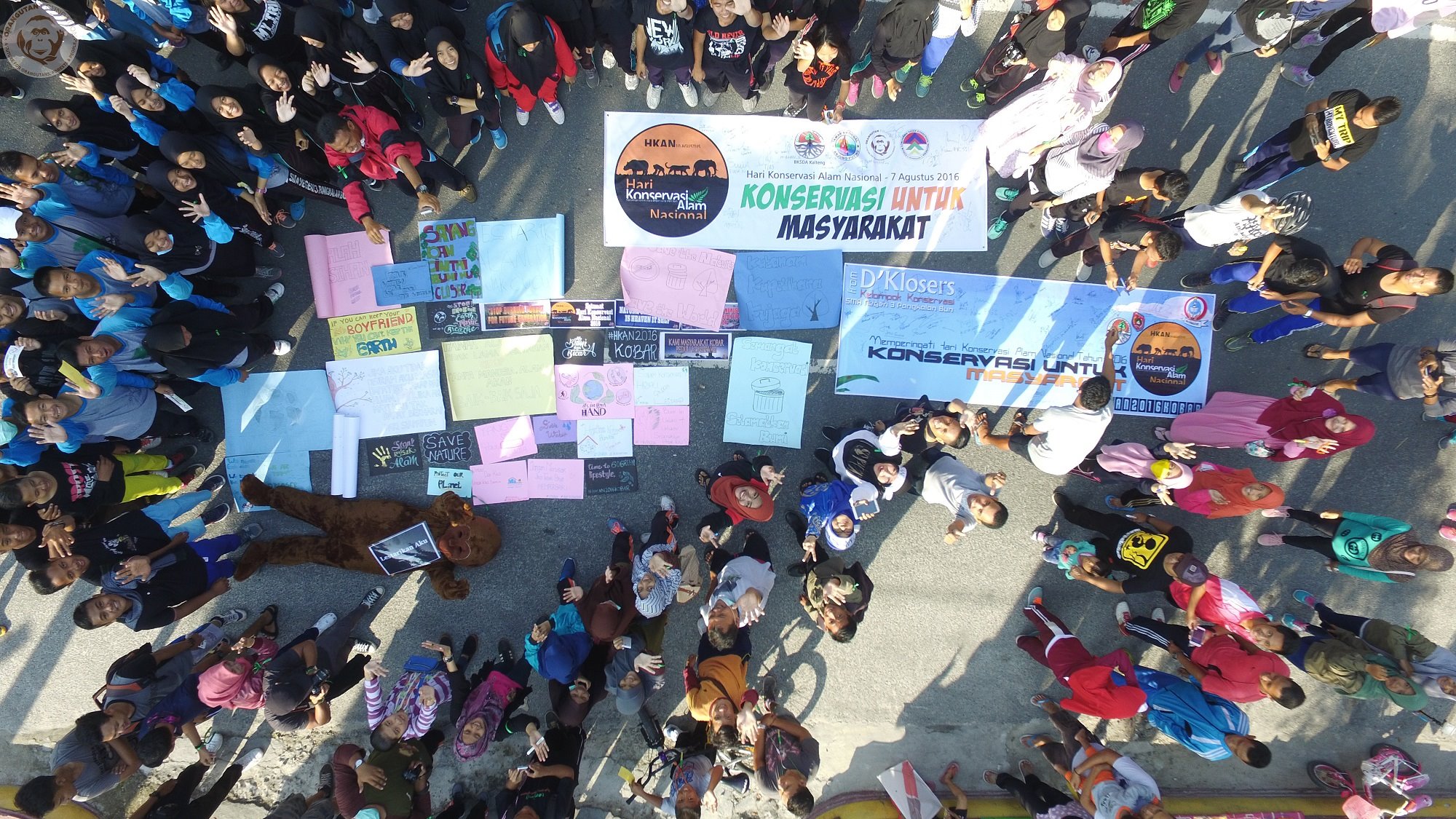
The overall aim is to increase community awareness about the environment and the presence of wild orangutans in the surrounding forests. Leaflets will be distributed informing people how to avoid human-orangutan conflicts.
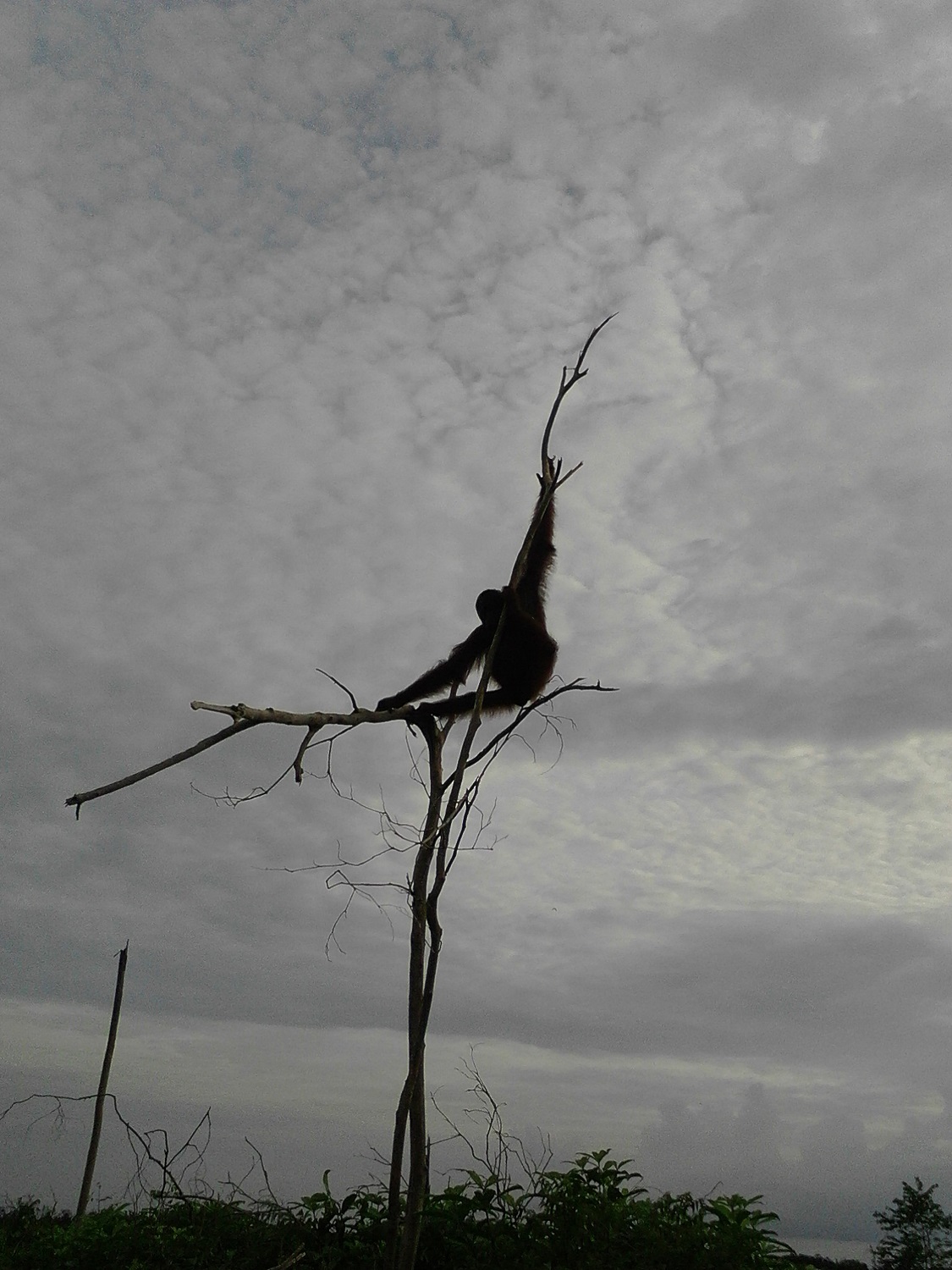
This action is needed more now, than ever before.
Watch this space for news and images of how the festivities went.
Wild orangutan rescued and moved to safety
When our staff arrived at the oil-palm plantation they found the orangutan in an area of forest, on the riverbank of the plantation. We had been called in to help by BKSDA SKW II Pangkalan Bun (government agency for wildlife) who had received reports from an oil-palm plantation of an orangutan in their plantation. It was decided to capture the orangutan and move her to the protected Lamandau Wildlife Reserve, to avoid potential conflict.
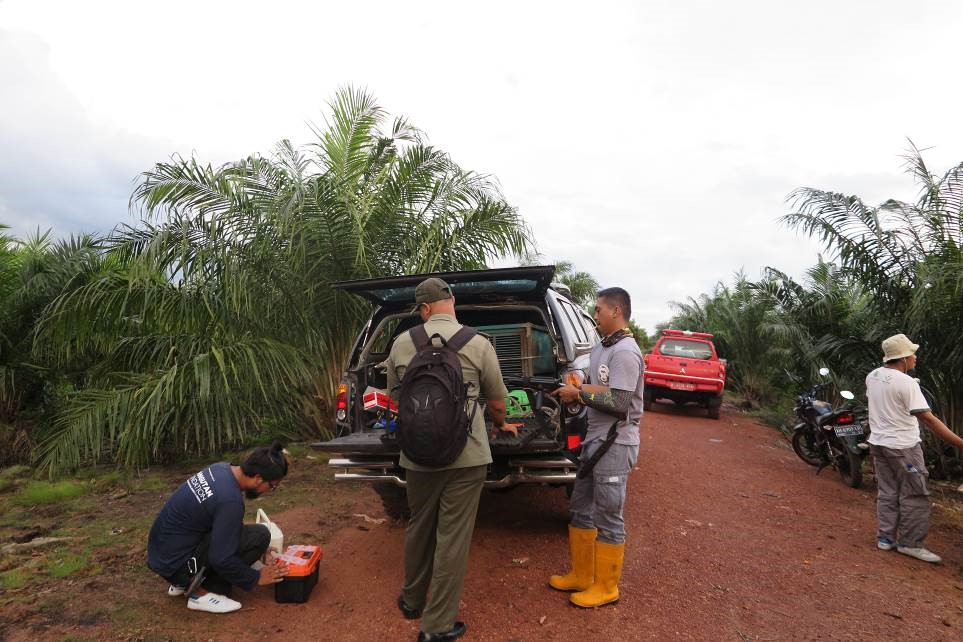
The orangutan, who they identified as female, had made and was resting in a nest. This made it easier to dart her as she wasn’t moving.
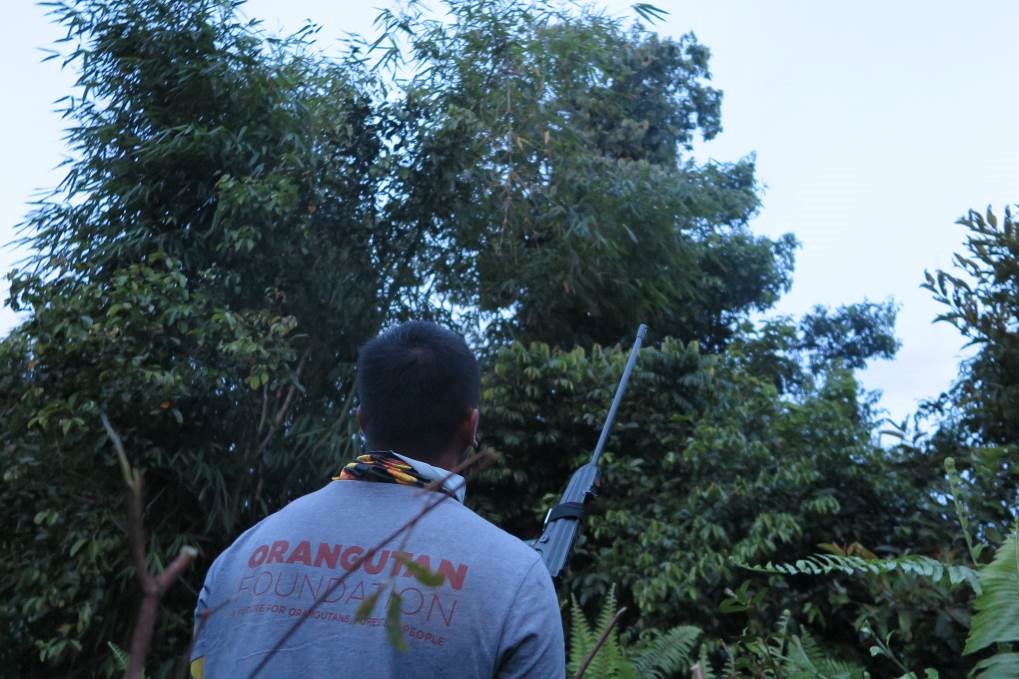
What our staff hadn’t anticipated was that she might just remain where she was and fall asleep, making it very difficult to then rescue her. This is just what happened!
One of our rescue team staff, Mr Nasibah, also an expert tree climber, shinnied up the tree to the nest. With huge effort he managed to lower the unconscious orangutan out of her nest. Our staff on the ground, used netting to catch her, as she fell to the ground.
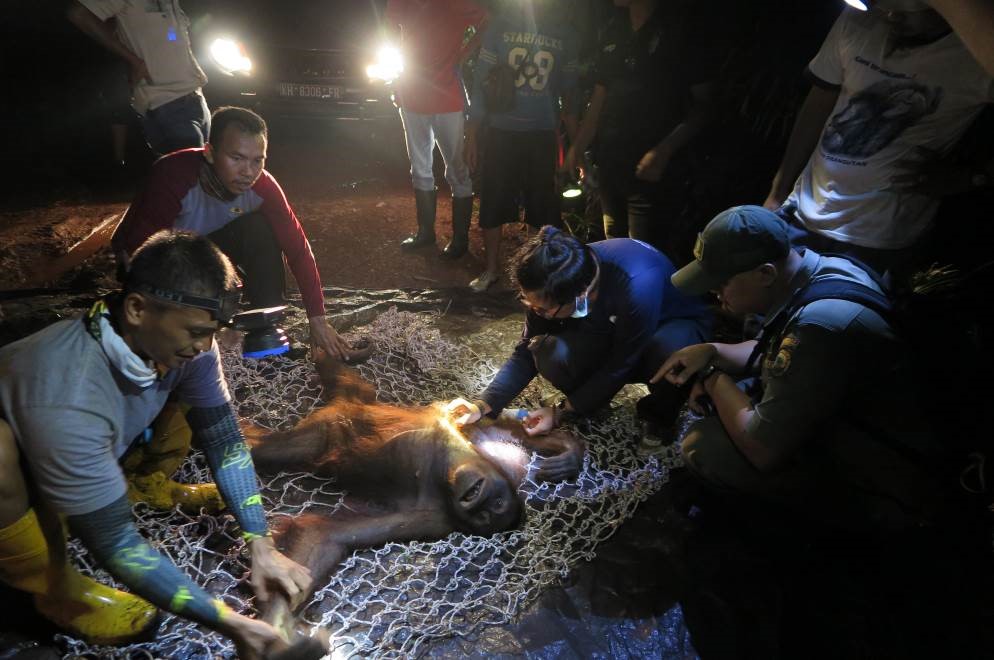
She was quickly transported to an open area where our vet Dr Dimas, examined her. Apart from a small scratch to her chest, she was in full health, weighing 45 kilos and was thought to be around 18 years-old. The scratch was cleaned and injected with long-acting antibiotics to prevent infection.
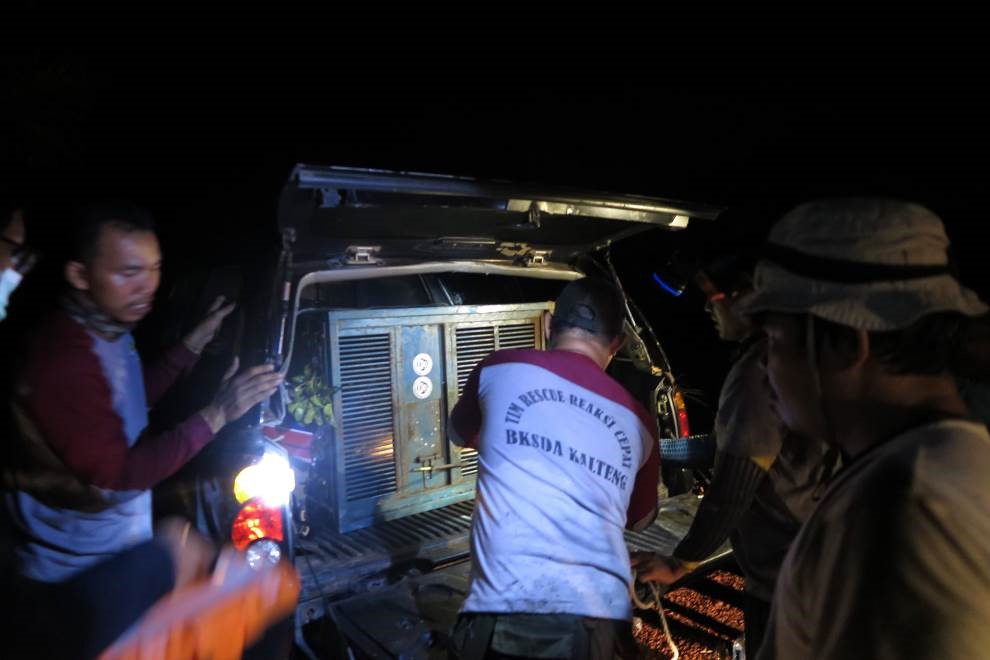
Two days later the orangutan was released in the Lamandau Widlife Reserve, on the opposite side of the river from Camp JL. We protect this forest reserve with guard posts and regular forest patrols to prevent and deter illegal activities.

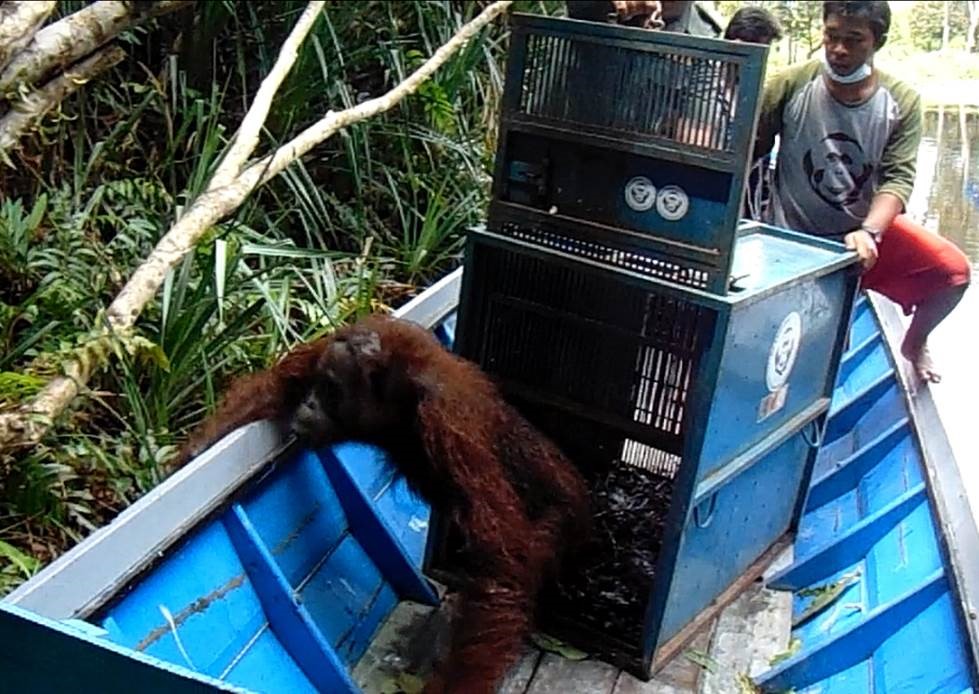
As soon as the transport cage door was opened she actively climbed into the nearby trees and disappeared into the forest.This, we hope, is her last encounter with humans.

The Lamandau Wildlife Reserve totals 158,144 acres of tropical forest and is home to a population of more than 500 orangutans. Half of these were reintroduced or translocated and given a second chance of survival in the wild. We must make sure they are stay safe. Please donate to our urgent appeal – DONATE TODAY
Protecting orangutan habitat
We only send out appeals when there is a real need for help – and right now, we urgently need funds to strengthen the protection of the Lamandau Wildlife Reserve, habitat of the critically endangered orangutan. In January and February, our forest patrol staff detected and tackled fires, deliberately lit to clear land, next to the reserve. They prevented the fires from spreading and saved thousands of acres of peat swamp forest from going up in smoke. In March, we met with the provincial government to push for those responsible for starting the fires, to be held to account.
The Lamandau Wildlife Reserve totals 158,144 acres of tropical forest. The Foundation's staff put themselves at risk as they battled to protect the forests, home to a population of 500 orangutans. Half of these were reintroduced or translocated by the Orangutan Foundation and given a second chance of survival in the wild. We must make sure they are safe.
It costs a quarter of a million pounds a year to protect the reserve and the wildlife. A significant commitment for a small charity, but a relatively small amount considering the invaluable riches and services the forests contain and provide.
The Orangutan Foundation runs and staffs eight guard posts in and around Lamandau to deter and prevent access to the forests. Our staff, all committed local Indonesian conservationists, patrol on foot or by boat. We use conservation drones and GIS to map and document illegal activities.
The map below shows the guard posts (red triangle on blue).
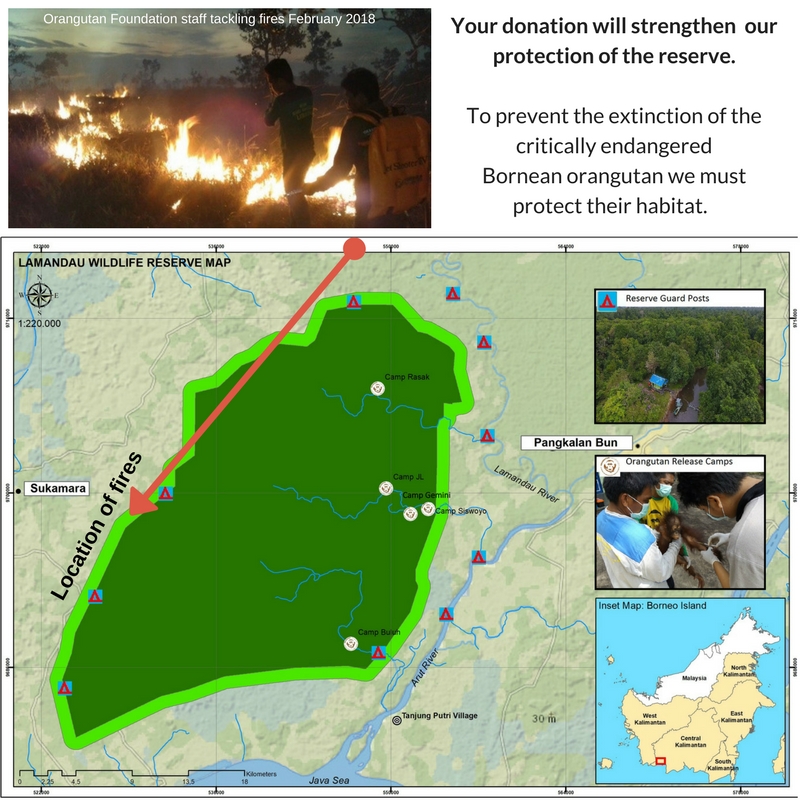
In 2017, we stopped illegal mining inside the reserve and since the beginning of 2018, our forest patrols have detected and stopped two cases of illegal logging.
Yet, despite years of investment in successful community awareness, there remain a small few who want to exploit the forest for their own interests. As pressure for land increases our fight to protect standing forest, to stop it being logged or converted to oil palm, will only become more difficult. Protecting Lamandau is an ongoing commitment: we cannot temporarily close a guard post due to insufficient funds, in the hope that we might start up again next year. If we stop protecting the reserve, we know that we will lose it: the forest and its precious wildlife could be gone in an instant.
Bangkal is one of the orangutans at risk. Originally released into the neighbouring Tanjung Puting National Park, Bangkal was severely injured in 2000 when illegal loggers attacked him with boiling-hot oil. Following a long period of recovery, he was released into Lamandau, at Camp Gemini, one of our five release camps in the reserve. Bangkal, now strong, healthy and independent, has since become the dominant male.Aan, an adult female, was shot and permanently blinded in an oil-palm plantation. Foundation staff moved Aan to the Lamandau Reserve, where she now lives with round-the-clock monitoring by our staff and vet.
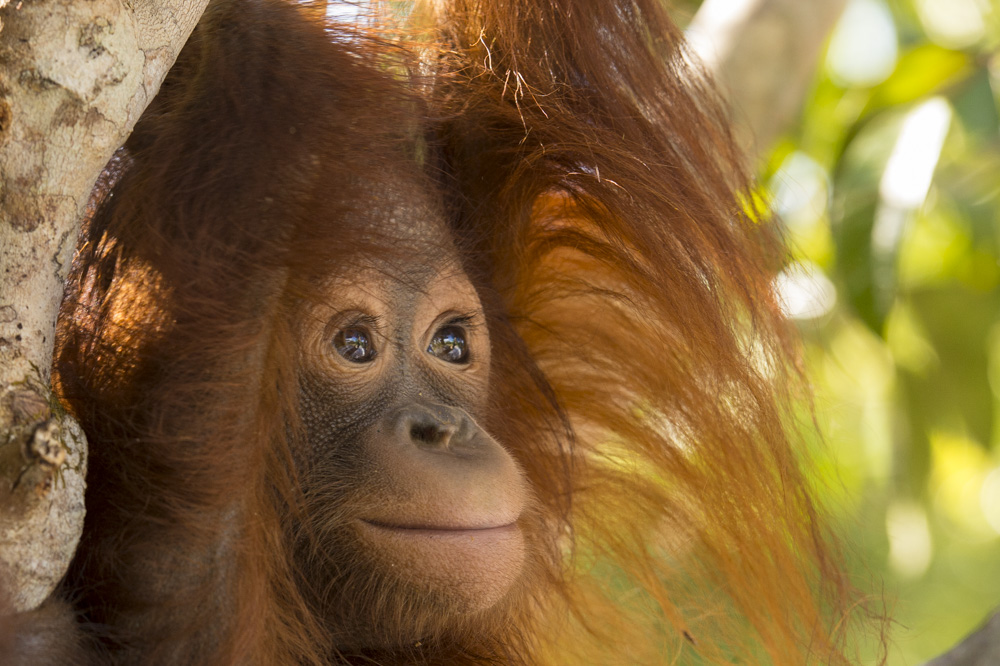
We also care for ten orphaned infant orangutans at our release camps - plus many dozens of reintroduced and translocated adults that are thriving in the wild under our protection. We owe it to these orangutans to keep their forest home safe.
Please DONATE SECURELY THROUGH OUR WEBSITE, by calling 020 7724 2912, or by sending a cheque payable to ‘Orangutan Foundation’ to Orangutan Foundation, 7 Kent Terrace, London, NW1 4RP. If you are unable to donate immediately but want to make funding pledge, whether through fundraising or a delayed donation, please contact us to discuss options – we will work with you however we can.
Sponsor the protection of Lamandau Wildlife Reserve
- £15 protects 10 acres of forest for one year
- £37.50 protects 25 acres of forest for one year
- £75 protects 50 acres of forest for one year
- £150 protects 100 acres of forest for one year
We must act today to secure the future for orangutans, forests and people.
With sincere thanks,
Ashley Leiman OBE
Founder & Director/Trustee
![]()
Stop habitat loss, stop orangutans being killed
In the last month we have heard disturbing reports about the cruel and brutal killing of two critically endangered Bornean orangutans. Sadly, our staff care for the victims, of these sort of actions, every day. We're still caring for Aan, shot 104 times and left permanently blind. Little Bumi, rescued last year, 8 pellets removed, his mother must have been shot and killed.
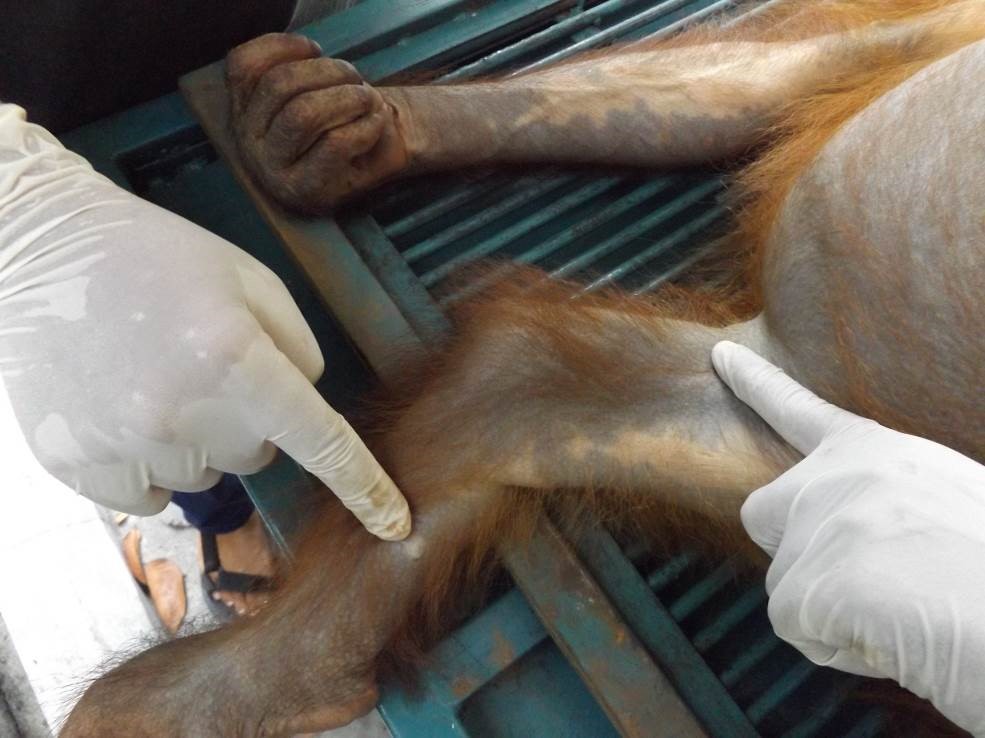
We ask ourselves, how could someone harm these gentle, intelligent and peaceful beings?
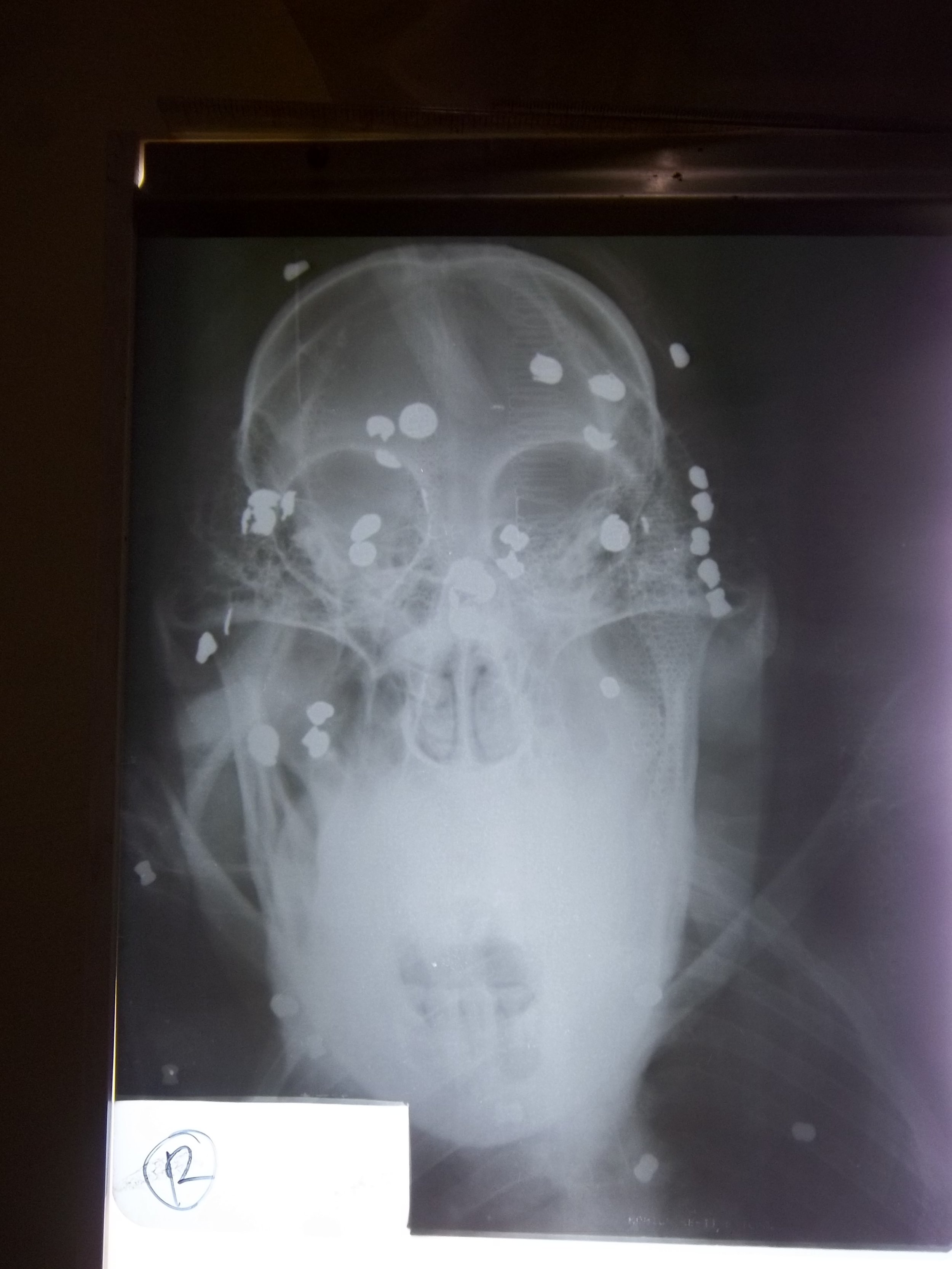
The killing of an orangutan is a visible threat, rightly generating shock and outrage. The invisible threat that forces orangutans into increasing contact with humans, onto oil-palm plantations or village farms, is habitat loss. We use the term invisible because habitat loss does not elicit the same level of response as an orangutan killing.
In the last month our guard post staff have tackled illegally lit fires and prevented them spreading, but still 30 hectares burnt. This week, they detected the second case this year of illegal logging, right on the boundary of the Lamandau Wildlife Reserve. This is meant to be strictly protected forest, it has a population of over 500 orangutans. We need to keep it protected and the orangutans safe.
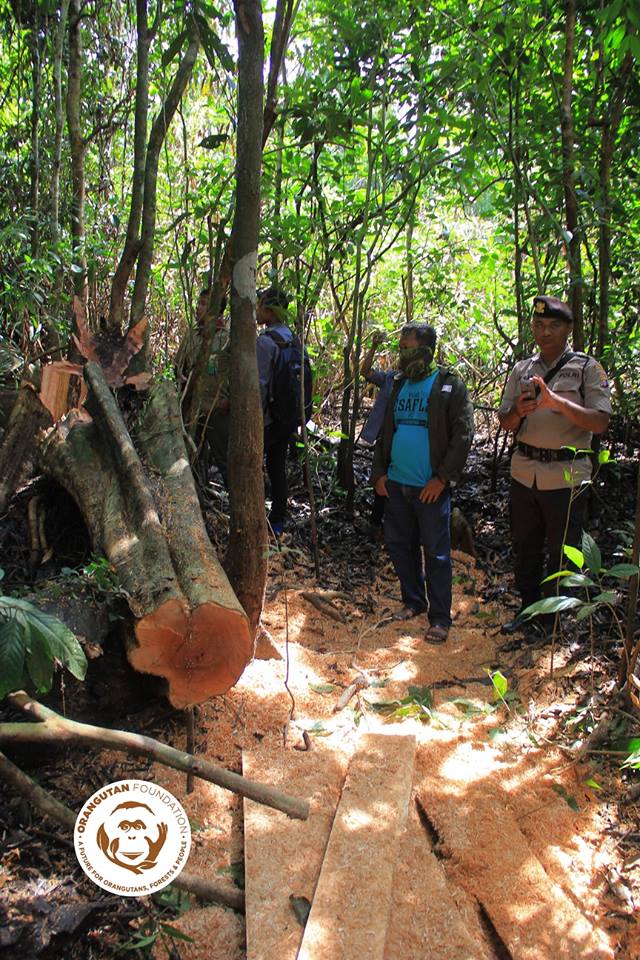
Why does the image of a fallen tree not also generate the same outrage? When forests are cleared, orangutans and hundreds of other species are harmed or even killed. Some survive, if they can move to another area of forest. This increases competition for resources and forces them into closer contact with humans. It is because we can’t see the immediate impact on orangutans and so our response is different.
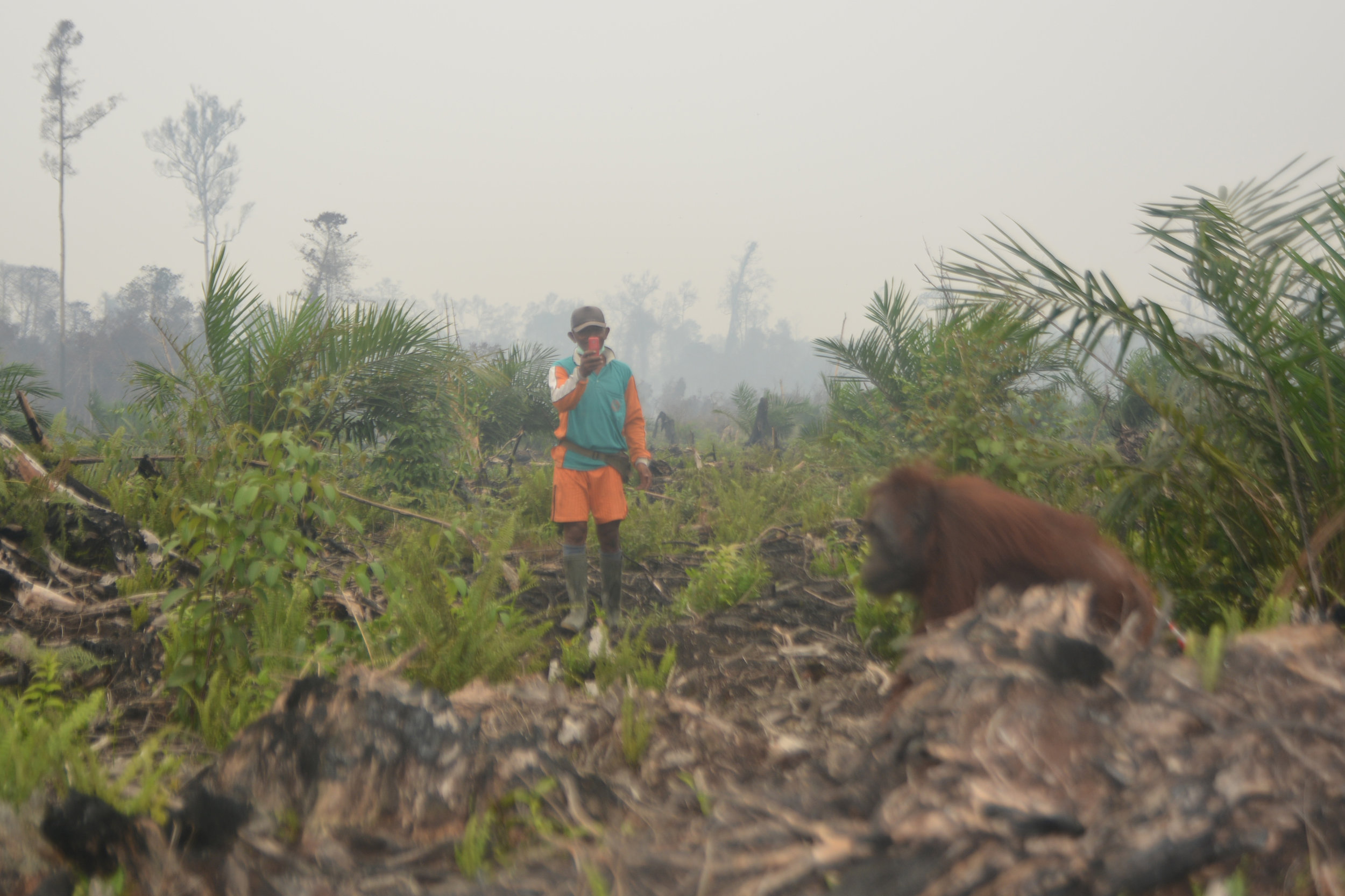
We need your help now, more than ever. Our guard post patrol staff require ongoing support to prevent illegal activities and further loss of orangutan habitat. The Lamandau Wildlife Reserve is huge, 158,144 acres of tropical forest (one acre is the approximate size of one football pitch). Our staff do a fabulous job patrolling such a large area but need to be supported.
Please help us to keep these vital forests standing and their precious inhabitants in wild. Please donate today.
If you can, please consider becoming a Guardian of Lamandau Wildlife Reserve, from £16.50 a month (the equivalent of 55p a day) you can make a significant difference. Thank you.
We thank the West Kotawaringin Police, KPHP Kotawaringin Barat, and BKSDA Kalteng for their joint patrols.
Vet's first orangutan rescue
The Orangutan Foundation is delighted to welcome Dimas Yuzrifar as its new vet, replacing Dr Steven, who has now returned to Bali. Being "thrown in at the deep end" is certainly how the first week has been for Dr Dimas! Last weekend we received reports of a wild orangutan in village forest. This was passed onto the government agency for wildlife, BKSDA SKW II Pangkalan Bun.
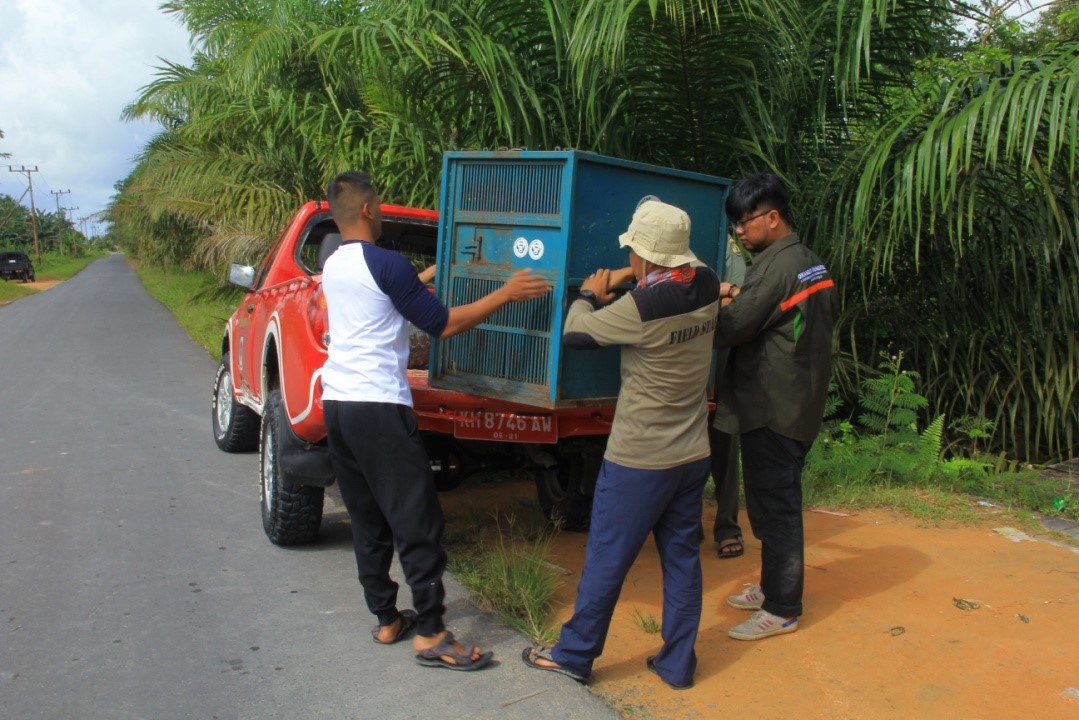
The orangutan was found close to oil palm, banana and rubber plantations owned by local residents. The villagers feared the orangutan would damage their crops and so BKSDA decided, in this case, to capture and move (translocate) the orangutan, to avoid any conflict arising. Dr Dimas managed to anesthetize the orangutan. After being caught the orangutan was identified as female with an estimated weight of around 25 kg. The next day after checking the orangutan was well and active she was released into the safety of the protected Lamandau Willdife Reserve.
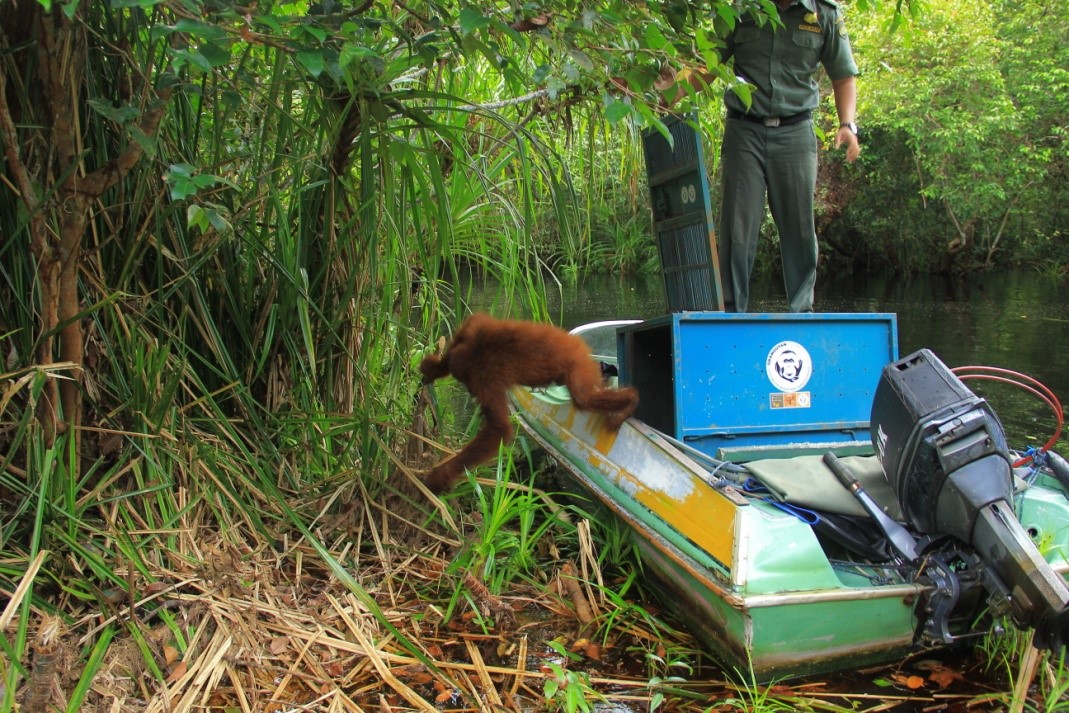
Watch this clip to see how quickly the orangutan leaves the transport cage and disappears into the forest.
After the busy weekend with the translocation, Dr Dimas also spent time meeting and checking up on the young orangutans in our release camps. Here's a clip of young Satria playing in his night-time enclosure.
Wonder what the next week will have in store?
Thank you for supporting our work.
Donate to help us keep the Lamandau Wildlife Reserve and its precious orangutans and wildlife protected. Click here to donate - thank you.


